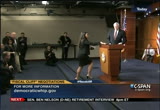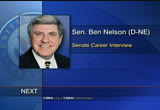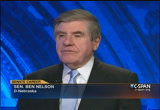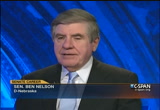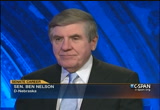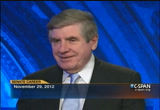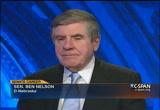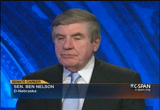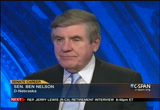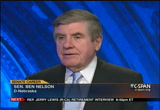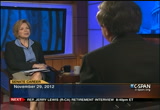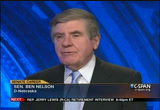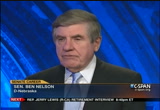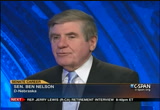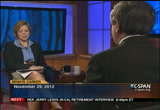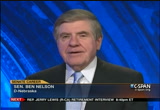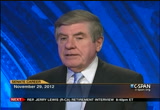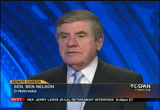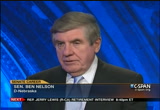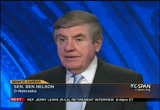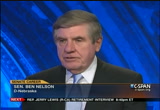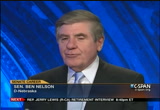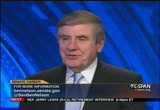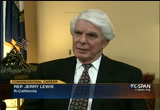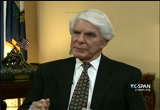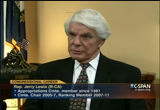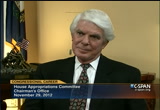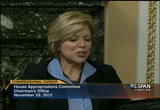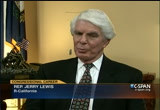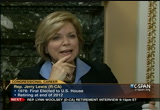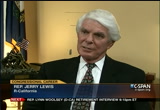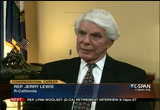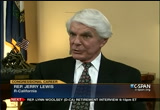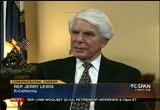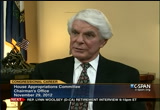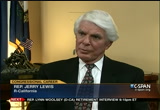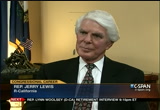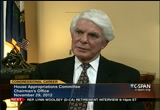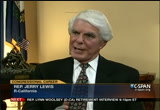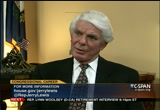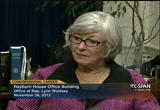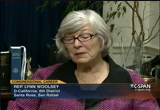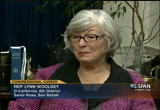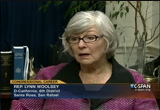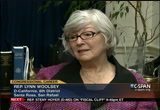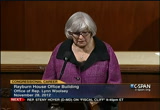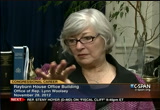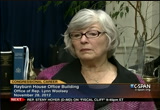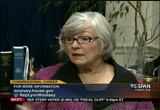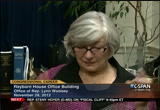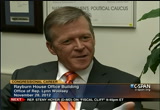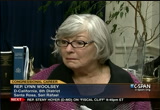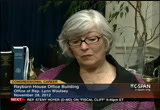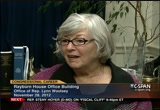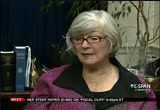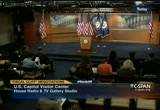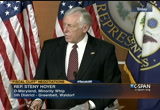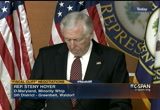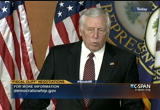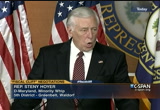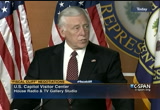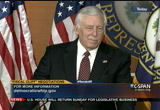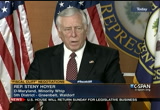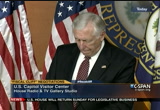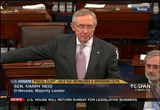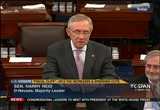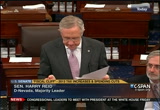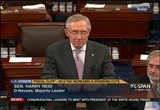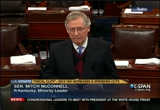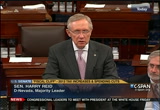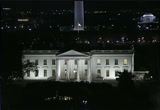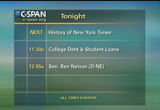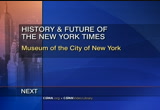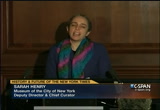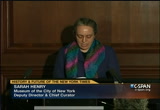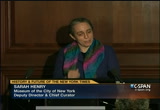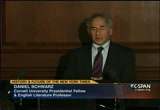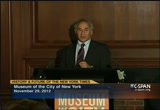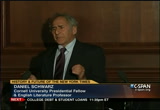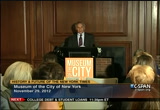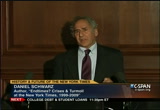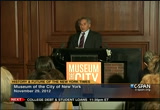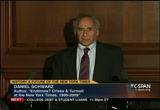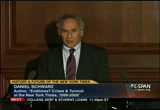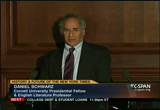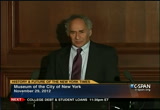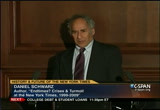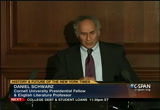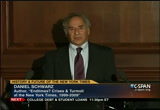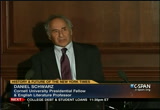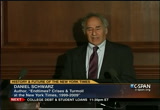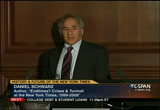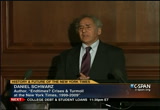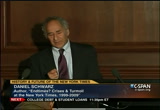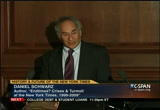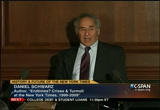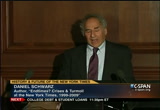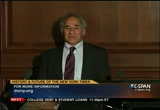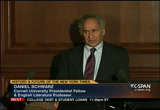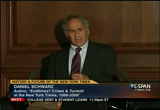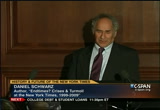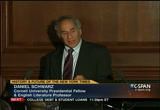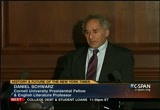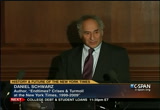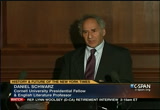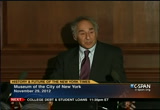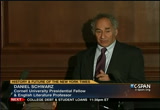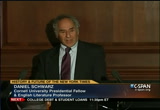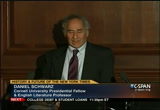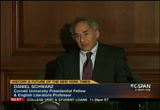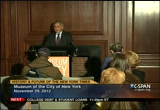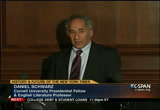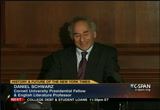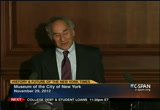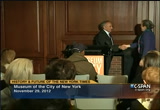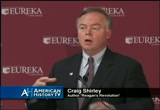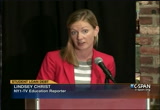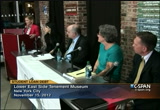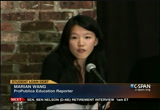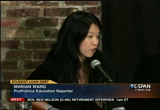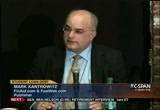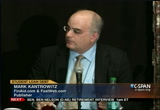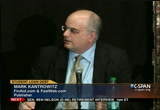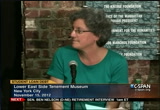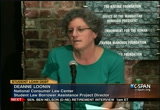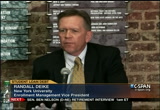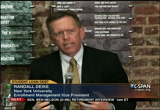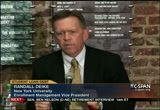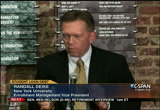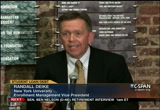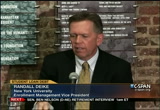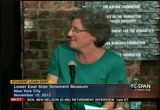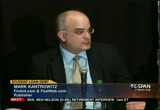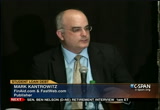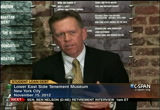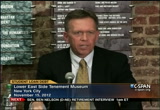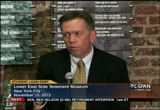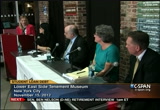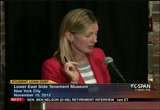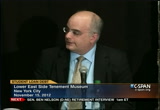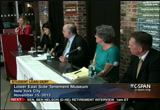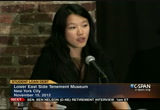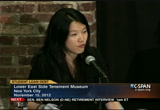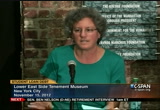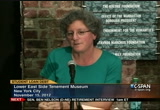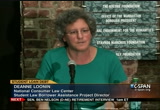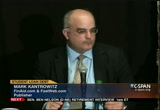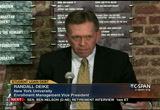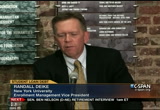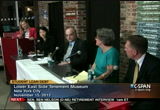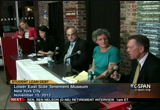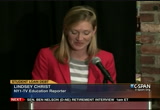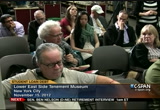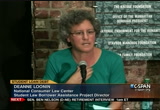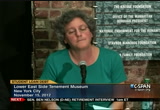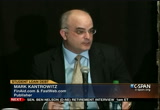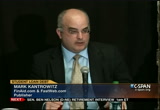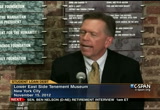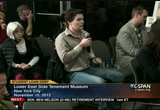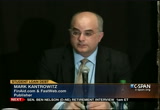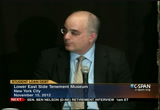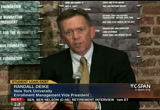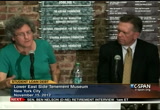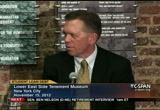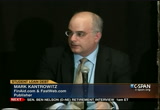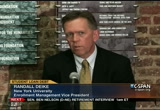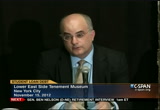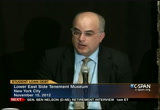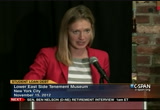tv Capitol Hill Hearings CSPAN December 27, 2012 8:00pm-1:00am EST
8:00 pm
by the way, merry christmas and happy new year. >> coming up, congressional retirement interviews. we spoke with ben nelson. that is followed by a jerry lewis -- by jerry lewis. senator ben nelson is retiring fr the senate aft 12 yea he spoke to us about why he thinks compromise in the senate is not a four-letter word. this is 40 minutes.
8:01 pm
>> thank you for spending a half-hour with us to talk about your 12 years in washington. it ended with the reelection of barack obama. if you could think of adjectives, what would they be to describe these seven years? >> interesting. challenging. sometimes totally frustrating. full of opportunities for the country. there were good times during these 12 years, laced together with some that were not so good. 9/11. the anthrax scare. there were also positive things. the election of barack obama i thought was a very positive statement for the country and moving forward in a way out of a fiscal of this. abyss.thi
8:02 pm
i could not have imagined a better time to have been here with all of the things that have happened. >> let me ask you to look back over those 12 years and ask what the high point was. >> when we could work together. maybe the single event that would and body that is the gang of 14. john mccain and i put together six other democrats and six other republicans to avoid what was then called the nuclear option, changing the rules, turning the senate into a smaller version of the house, where the rights of the minority caucus are ignored.
8:03 pm
consequently, we were able to work together that way, crossing party lines, crossing with the id administration wanted done or what the caucus leadership on both sides wanted done, it showed we had a certain independence. i will never forget the late senator robert sitting in an office with us all together, sobbing, saying, we saved the senate. we came to an agreement that we were going to vote to give a judicial appointees and up or down vote, rather than having to
8:04 pm
go to a filibuster. it was very difficult to get 60 votes. it was difficult at times to get 60 votes to tell what day it was or whether it was day or night. we proved we could work together. for that period of time, there was a willingness to cooperate and work together, the likes of which we have not seen since. >> harry reid has announced an interest in changing filibuster rules. do you support a change? >> we have to do something. it is a process -- people think of a filibuster in dummy mr.
8:05 pm
smith goes to washington." i think we should have those rules in place to change it so mr. smith stays on the floor during the filibuster. it does not just run time against the san that -- senate. it does not make any sense. if somebody feels strongly enough that they want to bring the senate to a halt, they should be willing to stay there on the floor and explain why, and i think it would be self in force and rigid enforcing if people would be less likely to.
8:06 pm
people look at the senate and cannot work together, cannot get anything done, and one person wants their pay to be docked. >> and the other reforms or tuneups? >> -- any other reforms or tuneups? >> if somebody put a hold on it, you could not find out who did it. secret holds on nominees. once you put a hold on them, that was it. that was wrong. we have cleaned up the rules in many different ways where we --
8:07 pm
ways. you would have 860 vote threshold to do some like that. the people back home cannot understand that. they should not accept it. >> what about the lowest point? >> as part of the affordable care at, i tried to get medicaid for the expansion of medicaid, to take some of the burden off the states. back in 2003, i got medicaid payments by the government to help the state's struggling with their medicaid costs. $20 billion will able to spread across the states to help them because they were unable to meet
8:08 pm
the rising costs. in 2017, they're going to have a larger share of the costs. we need that is taken care of. they did not know what the cost was. they put a number in as a place holder and it looked like i was doing something for my state when i wasn't. i was trying to get it for all the states. that is what happened. i wanted to get it knocked out -- but if people wanted an opt out. the supreme court gave that. this got used against me as though i was trying to do
8:09 pm
something i should not have. i was not. the interesting thing is i was asked to do this by the nebraska governor. i did not get a thank you from another governor, who was from another state. >> during that time, you experienced the radio talk-show host circuit and the cable tv circuit. what was that time like and what do you think the echo chamber in american politics today does? >> it is a difficult thing to deal with. it is not just broadcast. it is the blogs and tweets, all the electronic communications. >> in 2000, we do not -- did not have that. >> i was not prepared with what would happen. it was not a condition i had for
8:10 pm
voting for the bill. i thought it was fairness. i wanted the single payer government option out and i wanted to get adequate language in for abortion. i was not prepared for that. it has changed the news process today away from things that are corroborated and fact checked to the formation and dissemination of one opinion after another, not based on fact. that has been harmful to the process. if people are not willing to try to get both sides, and only 11 side presented to them, you do
8:11 pm
not have the informed citizenry you need to have in a democracy. >> with that perspective, now that the affordable care act will begin to become fully finalized into law over the next couple years, we keep hearing those on the conservative side is concerns about what it will do to the country. what are your concerns? will this be a good thing? >> yes, it will. right now, we have $50 billion a year of uncompensated care. people who do not have insurance, do not have medicaid, medicare, private insurance, mode carry coverage, they are not insured.
8:12 pm
they have access to health care in emergency rooms and if they cannot pay, and they do not go to bankruptcy, it costs -- the care does not go away. it is shifted to the rest of us who do have insurance. $50 billion. it could be as much as $1,500 per person. paying for those who do not. you have everybody in the system all injured one way or another, then the uncompensated care goes away. it is no longer borne by those of us who are beneficiaries of an insurance program. that alone is a hidden tax people do not focus on unless it is pointed out to them.
8:13 pm
it raises the cost to everyone else. the fact never gets talked about. should. >> the largest government health care program, medicare, is reported to have brought levels as high as $64 billion a year. you can imagine the frustration on the part of the public. why has the city never been able to get its arms around that level of fraud and abuse and what does it say for the expansion of government? >> it is expenses -- expensive to weed out the fraud and abuse. it takes a lot of government time and money. i do think it is worth doing. her we do not do it nearly enough.
8:14 pm
but it has been something -- government, at times, is wasteful in what it does not do as much as it is in what it does do. it never is risen to the top level as i think it should and hope it does. one of the reasons i did not want a government-run option is because that would have been a dumping ground for another government program to provide insurance and move away from the private market. i believe in the private market for insurance. there are cases where people are not insurable in the private market, that you have a government program. that is why it came about. " we are capable of crunching numbers to figure out how you cover people of a certain age
8:15 pm
block of have an entire barac them. we were able to find a way to do it through a private market, which is my preference. sometimes, they are not necessary. we ought to distinguish and not throw one against the other or think they can compete. they cannot. the private market has not been able to find a way to cover seniors 65 and above without trading dollars. that is why it became a government program. >> let me go back to the idea of ce.promise and independents - barack obama talk about
8:16 pm
compromise. for you, described as a conservative democrat, who was criticized by your own party members when you compromised, and that targeted by the gop for reelection, what is your thought about the art of compromise and how much it is valued in this it? >> it is valued to talk about it. when one wants to work together. they send people back here who are committed not to work together. you have individuals who will not compromise, it becomes difficult to merge ideas and find compromises and accommodations in process or in implementation as opposed to principles. nobody has asked to compromise
8:17 pm
his or her principles when you are talking about compromise. not eliminating your view about one thing or another, so i think the word compromises over used, underutilized, and miss understood by an awful lot of people. it does not mean throwing in the towel. i have a couple friends i have talked to about compromises and i found in one instance there idea of a compromise is when i see it their way. when i give up where i am as opposed to finding compromise -- common ground. finding a middle way to do something rather than black or white. there is great. you find out what shades of gray you can adjust to. it is almost always not about
8:18 pm
principles. it is about implementation. >> what are some of the reasons the city got to this point? >> let me explain my political math. addition and multiplication. there are others whose political math might be subtraction and division. division in politics, the fighting with wedge issues and turning things into hateful mess, can win elections under certain circumstances. this country has been divided. you cannot stay stock. as lincoln said, a country divided against itself cannot stand. if you look at where we have been, obstructionism, deadlock,
8:19 pm
gridlock, not being able to move forward, pushing this country to a fiscal cliff, pushing a year and a half ago toward default on borrowing obligations, there are enough people now who have taken the approach that you have got to bring this country to its knees to bring it to the senses. that means defaults, over the cliff, whenever it means. that is not productive and it is not necessary and we should not be thinking that way. we have to come together on this. those who want more spending understand there will be less spending. those who do not want to deal with taxes at all, now there is some softening about where they are prepared to go on that. has been the division that has gotten to the point of almost
8:20 pm
eight fullness. -- hateful mess. ness. go back to 2009, the frustrations of people coming out, this is their country, and ankles people had not seen any more, toward one another as opposed to civil discourse. that is where we are. we are moving away from it because people back home are beginning to see it and say, that is not what i want. i want to see my way wind. if my way cannot win, i want the country to win. >> hard line partisan has contributed? >> it contributes to it. i am in favor, i do not know at
8:21 pm
what level you have the commission, but get it out of the hands of those who do it for their own interests. that is wrong. it should not be about whether or not i have saved my seat by gerrymandering around to bring more republicans or democrats or get some out of my district. that is wrong. i had to deal with it when i was governor, and i told them i would not accept the plan i put up because that is what they did, splitting a county unnecessarily. my preference would have been to have somebody from the outside sitting down in a reasonable fashion as to what is best for the country, the district, the state. >> americans more and more identify themselves as
8:22 pm
political independence. what has that done over the past decades? >> not as much as super and the citizens united case. less partisanship. i happen to believe in political parties. in the nebraska legislatures, non-partisan. people run for the seat. they do not run as republicans or democrats. you know generally who they are, but it is not uncommon for democrats to be chairman of committees, even if there is a majority of republicans on officially. i come from an environment developed by the late senator who came to nebraska and fought
8:23 pm
for the legislature and officially was non-partisan. some people say he did it because he wanted to save money. the main reason he did it was to get rid of the conference committees that we go through back here. the work is a pile up on the football field. it changes hands five times before they blow the whistle. what we have in nebraska is officially nonpartisan and works. that is a backdrop for me. when i came here in a partisan environment, i said, i do not have to subscribe to a non partisan environment. my goal was one nebraska, not a republican or democratic or east or west.
8:24 pm
i represent all the people, even those who voted against me. i have taken that independent approach back here. i have to represent all of the people. >> did you ever contemplate becoming an independent? >> no, because the democratic party never pushed me out. i have been well excepted by the democrats in nebraska inaccepted by the democrats in nebraska. ultimately, the democrats did not leave me, so why would i lieina the democrats -- leave the democrats? >> there are so many changes that happened in this country.
8:25 pm
the whole concept of national security and how that has changed since 9/11 and whether we are in a place -- a better place? >> most people feel we are safer than we were. that is what national security is about. it is a state of mind sometimes as much as it is a state of security. i think people feel they are better off. i am glad that is the case. what we have gone through is a difficult price, a high price, to get to this level. it is not just the inconvenience at an airport. it is not just the fact i cannot pull my car into the building anymore. it is not that i have to show my id. it is not that.
8:26 pm
what i worry most about is what we have given to the government in terms of the ability of the government to spy on us and how that has evolved. people are bothered as much by that as they are about almost anything else. i think we have to continue to reconsider some of the things that have been done, the granting of broad powers for investigateing, so we do not mae a permanent mistake for a temporary experience to protect ourselves from radical islamists and terrorists who continue to be ready to sacrifice themselves to take us out.
8:27 pm
i hope we reconsider some of the things we have put in place and ask, are they the reason we are safe? if they are gone, would we be less safe? are there other ways to be able to do some of the security measures that would get a better result? i believe in cost-benefit analysis. if the cost is too high, weighed against the benefit, you have to ask, should we do that? what is the risk assessment we get from these measures? i think you need to take a common sense, rational approach to them rather than an emotional reaction. >> what are your reflections on the country's prosecution of the two major wars? >> it is pretty hard to be critical of the role we have had in going into afghanistan to
8:28 pm
reduce the taliban and to eliminate it as a safe haven for the al qaeda operatives as it was at that time. it is pretty hard to be against that. getting out has taken longer than any other war in history, to extricate ourselves in a appropriate fashion. we were told there were weapons of mass defection. there it -- i think people have legitimate questions to ask about iraq. >> what about your own views? >> my reflection is, what i have voted just to take out a dom hussein? no. what i vote to take out saddam
8:29 pm
hussein because he has weapons of mass destruction that he could use against us or others, israel, or other locations? that is a different question. >> we have a few minutes left. sometimes i see the description of you as a penny pincher. with that perspective, how did the country get into the situation we are in right now, with the huge debate over the size of the deficit and the debt? >> go back to 2001 and thereafter. the cost of the worst was not included in the -- wars was not
8:30 pm
included in the budget. they were always supplemental. they did not show as a deficit. while the budgets looked reasonable during that time, the actual spending was greater. people did not pay as much attention to the debt. it just kept mounting and growing. we borrowed to pay for the worse when we did not ask people to make sacrifices financially. there is a difference between borrowing in the future, pang forward and backwards, or having to pay right now. people might have felt differently if they had felt a pinch right at the time. they would have asked different questions than were asked. that is one of the reasons we got where we are. >> could you have been any more
8:31 pm
vocal about appropriations? >> i was vocal. when i got on the appropriations committee, i became chairman of the legislative branch. that is everything, all of the buildings. office buildings, 1700 capitol police forces, and all of their help, support staff. i held the growth flat. then we cut it by almost 5%. this time around, we let it grow a little bit higher. protect the dome so it did not fall in. what i tried to do was be as tight as three coats of paint,
8:32 pm
penny pinching to make sure if we set an example of reducing growth, if we could do it, others would not point to us and say, they are being hypocritical. i had more than a few comments from my colleagues about cutting back on senate budgets for your office and stuff like that. that is what you have to do. you have to watch the pennies and dollars every day in government, or they will get away from you. they do. we do not have enough people willing to say, no, to increase spending. the spending is not all wasteful. the question is is it all necessary or necessary to be done that way. >> mitt romney kept saying this country could be on the road to
8:33 pm
be more like greece if we did .ot get our arms around it the unemployment rate remains high. are you optimistic in the short term about our country's future. >> it is hard to be. i tried to be. if we can get this resolved, this fiscal cliff situation, and have a pathway to seeing the deficit be reduced, cannot do it overnight, if we can see there is a path, a trajectory of slowing down the growth of spending to the point you can see the deficit will ultimately go away over a reasonable time, people will start investing again, hiring again, and i spoke to a business group yesterday and asked if they havwould hire just because they get a tax
8:34 pm
credit for hiring people. they said no. if you see the deficit will go away and there is hope we are on the right path to fiscal sanity, will you then hired? yes. we will have markets for our products and services and then we will need more people. we are stuck right now because all we have done for a year and a half was kick the can down the road. i voted against the act a year- and-a-half ago because i predicted we would be right where we were going to be at the end of this year. we had a year and a half to work together and build a bridge so we would not fall off a cliff. what did we do? electioneering. it was all about waiting until the election is over. when the elections become more important than governing the country, you get into the
8:35 pm
trouble we are in. it is not just wild spending. it is not just tax loopholes. it is about governing and fiscally managing things as you go along. it does not just have to be in the white house. it has got to be in congress as well. >> given the frustrations you have voice, if a grandchild said they want to go into politics, would you rejoice? >> i would be straightforward with them. when i decided i wanted to run for governor, somebody asked me if my skin was thick enough. i said, sure. i would encourage them to do it. there are bumps in the road and historical changes we have all seen and they will continue to happen. i predict longer-term there will be more independent-minded
8:36 pm
people who want to work together to get things accomplished. the bipartisan word will ultimately have more application. i was amused harry reid came back from a meeting at the white house and was asked what happened and whether there was a lot of happy talk. we have to move from that to the appropriate action. i understand you have to stand for principle. i also know this country has to move forward. ideologically driven to extremes, special interest groups, and others who are not willing to sit down and find
8:37 pm
solutions, are causing us to be stuck. somebody said we are neutral. you cannot be in neutral if you are in reverse. you are losing ground. that is a temporary situation. the question is how long. i do not know. i am optimistic because we cannot continue this way. people will ultimately understand we cannot. hopefully, that is before this year ends. >> what is it like to be a lame duck? >> you are not a dead duck. you are still in office. the session almost becomes like daffy duck if you are not careful. i am as committed today to finishing this job by the very last day as the was i started. -- as i was when i started.
8:38 pm
the majority got us into this mess right now by passing the not workingrol lasact together. i want the members of house and senate in both caucuses remember it was bipartisan to work together to get us out of it. i pledge to continue to work. i knew in my heart of hearts all we would do was kick the can down the road the road. it all comes to the alternate deadline. i worried things would get worse. you do not resolve things with procrastination. >> what do you think about doing next? >> i will not retire. i have no desire to.
8:39 pm
i may slow down. somebody asked if i will be as interested as what is going on in washington as you are this year. of course. but i will take time for myself and family and friends. i intend to be engaged and hopefully someone will ask me to serve on an advisory board. i will occupy my time with productive pursuits, some of them that i have had to put off. people have said why did you not just run for a third term. i looked at the game clock and i know i can do those things today, but seven years is a lot of time and i did not see how i'd ever get back to the bucket list. one of my kids said i want more time with you.
8:40 pm
with grandkids and family, you need to spend more time doing that. they have sacrificed more than i have actually. i have been able to do what i have wanted to do and they have had to give up time with me. it is time for them not to have to sacrifice. >> enjoy the pursuit of the bucket list and thank you for the time you gave to us. >> great to be with you. thank you. [captioning performed by national captioning institute] [captions copyright national cable satellite corp. 2012] >> >on "washington journal," damian paletta, randal o'toole, and alisha coleman-jensen.
8:41 pm
live at 7:00 a.m. on c-span. >> jerry lewis represents the 41st district in california, which includes riverside county. this interview is 30 minutes. >> congressmen jerry lewis, you are leaving after three plus decades here. in what ways is this institution different than when you joined? >> there have been many changes. the most significant difficulty with those changes is we have tended recently to more and more polarized ourselves.
8:42 pm
there is a tendency to want to paint everything in partisan terms. 90% of the issues we deal with have nothing to do with partisan politics. we are here to attempt to respond to our needs -- constituency needs in a way that reflects their priorities. the partisanship has gotten in the way of members working with each other. >> can you trace the roots of that? >> i think i can. i arrived here in 1979. one of my classmates was newt gingrich. early on, he took on as his target, the speaker jim wright. that was the beginning of the rigid of some of this polarization. there is low -- the beginning of some of this polarization.
8:43 pm
it was a better time. since those last couple of decades, the institution has suffered from too much partisanship. >> before mr. gingrich, i would imagine he would argue the republican house members have spent decades in the wilderness and he was the one that found a way to bring them into the majority in the house. how do you balance the pluses and minuses? >> there is not any question that that effort to paint a picture of jim wright's service laid the foundation for a majority. that was a healthy thing. i do not believe it was a good -- we have been in that for far too long. appropriations committees work is where either you spend money
8:44 pm
or you do not. ideally, you are here to work with one another to be as responsive as possible to your own constituents and taxpayers. within the committee itself, the more we can talk to each other as individuals and human beings, the better off the institution will be. >> the kinds of organizations that track members' votes, when they look at yours, saw an ad and earlier you more frequently crossed the aisle to vote with democrats. in your later service, 96% rating. is that reflective -- you tell me. did the house change? >> it is a reflection of polarization that takes place at a leadership level. party loyalty to it -- loyalty is important.
8:45 pm
but our voice can be heard in a fashion that says we can work together best at the subcommittee level where we talk to each other about policy direction. it is important for members to talk to each other as human beings. >> there are many people decrying the partisanship. some who think it is great. if you think it has been a bad thing for the institution, do you see it as the foreseeable future or are there agents of change that would allow more across the aisle working together? >> i feel very strongly there is really hope that we will recognize the value of talking to each other, that we will return to more bipartisanship and realizing we can best serve our own constituents by knowing there is a great middle out there that makes of america.
8:46 pm
the more we reflect the middle, the better off our committee will be and i think the service we provide will be better. >> what gives you that hope? >> a lot of people are recognizing the pathway we are on will not help. more and more members are talking with me where we discuss with one another how we can improve the place. i hear it almost every day. i encourage it. >> there are people who believe partisanship is a good thing because ideology and the direction of the country moves in the way they want. for example, people have come in with the tea party. what do you think of these hyper-partisan groups outside of the congress that attempt to exert their influence? >> one of the more fascinating
8:47 pm
experience i have had involves a gathering. my first meeting a couple years ago, with tea party types. my staff was concerned about this new group. i said, give me their telephone numbers. i invited them to our session. they were there that evening to express their concern about health care being nationalized and taking over that piece of their personal life. they were not angry with congress perce, but they wanted to see us spend whatever money we could spend, without assuming every answer lies in washington. one of the best things that has ever happened to us in our work, that somehow that will of lysing missed my house, is because i got elected to congress. >> talking about the appropriations process in particular, here we are with the fiscal cliff and we are in the lame-duck session, but the debt
8:48 pm
to gdp ratio for the united states has continued to arrive. there are many people who have pointed fingers. what is your response? >> there is no question the pattern in washington is to spend every dime we can collect. almost regardless. there is a view that says if a program is funded, it ought to continue to be. the appropriations committee has the responsibility of oversight to make sure we are using the dollars well. we went about reducing the appropriations. this has been over a decade ago. for every category of the president's budget within my subcommittee. we were successful. the first significant step of
8:49 pm
saying, we can spend less. we do not have to spend more on every program every year. >> what about the years you held the gavel? >> the commitment we made was to pass every appropriations bill by the fourth of july break. my staff said i am crazy. it was feasible if you went about the work seriously. by the fourth of the library, guess what? all of the bills had been passed. we were able to send everyone of those bills to the president's desk. they were signed in the law with bipartisan support. that sort of work can make a difference. more voices need to be heard in support of that effort. >> my recollection would be since then, it has been budgeting by continuing resolutions. >> we have done an awful lot. a lot of people do not realize
8:50 pm
we have demonstrated we can do this regular order. the more we move the committee back rather than having everything dominated in a speaker's office, the better off the congress will be. >> who loses and who gains when -- >> the existing agencies have their pipelines already clogged with money and we throw more money at it without any serious oversight. continuing resolutions are ignoring our responsibility and our goal is that we have got a job to do. it is time we get back to the responsibility. >> the nickname for the people who stare all the subcommittees
8:51 pm
are the cardinals. give me a bit of a backstage. it is depicted in television and movies as these very powerful individuals. the door closes and the work of washington gets done. what is it really like being a subcommittee chairman when you were chairman of the entire committee? >> i would speak directly of my work as chairman of the defense subcommittee that appropriates all the money for the national defence. one of the first things we did was to recognize with the advice and counsel of people within the military that we were on a pathway to build three different lines of tactical aircraft for the future, and a lot of money would be wasted unless you got a handle on it. the company that was involved
8:52 pm
was talking about the f-22 and procurement for the first aircraft. when they were talking about going forward, they had not tested whether the wings were ready yet. the whole program will have fallen off a cliff if we had not insisted we go back to the drawing board and do more testing and look again. because of that, the congress being directly involved, saying they may not be right on this one, we were able to move ourselves in the direction and make sure it would be the cutting edge for decades in the future in terms of america's air strength. >> we often hear who is right and who is to blame for the wasteful spending. some programs the military does
8:53 pm
not want continued to be funded because they have jobs. >> it is important for us to know the department of defense is not always right. for example, one of the early earmarks involved an arena known as unmanned air a coat -- area of vehicles. they did not have a person sitting in this seat. revolution in the way we deliver intelligence to an aircraft. they are now on the cutting edge of tomorrow's air force. it is important congress has its voice heard. i did not presume to know we were right. i did know there had to be some alternative evidence. we had a chance to look closely
8:54 pm
to america -- area of vehicles. >> we could probably offer some examples from the other direction, so let me understand how does the public get best served with the competing forces that all want their program to continue? >> it is a big part of our job. it is an appropriators responsibility to be involved in that fight. i must say it comes to mind that one of the first projects i was ever involved in, a young person dropped a ping-pong ball on his back window during the 1938 flood.
8:55 pm
the ball hit the water and floated outcom the back fence. and earmarked back here that led for the project the shores -- led to the project, that sort of work is very important. >> for a young congressman and women coming in with the freshman class, what was your own pathway to the chairman of gaffle, and could you offer them and vice -- advice? >> be patient. i was here for two years and decided this is crazy the way the place run spirits and me back home. i thought about doing that. an opportunity to go to the appropriations committee took
8:56 pm
place early on. that became my career's worked, fawcett -- focusing on the way our money expended -- is spent. to make sure we try not to overspend their money and assume every program must go on forever. >> it is not without its perils. there have been people who have had inappropriate relationships with lobbyists. all of those who wish to influence, you have had an investigation which did not go forward. i am wondering about the washington relationship with lobbyists and how the institution polices that. and how the public is well served in the process. >> we have an extended process
8:57 pm
within the house that has a responsibility to make sure we follow our own rules and guidelines. the vast percentage of my colleagues are here to serve their institution and their constituents well. they are not here to take through a back door, but rather involve themselves in the public process. the democrats in my district are more conservative than me. that is true to some extent. i believe deeply in the great center of america. most of our citizens want us to reflect as much as thespossible. the congress will be better served and we will do a decent job of dealing with their money. >> does it pain you the congressional approval rating is in the digits? >> people should be suspicious
8:58 pm
of what goes on away from their homes. 3,000 miles away in our case. it is our job to make sure they know we are attempting to reflect parties. one of the more interesting things is to presume that we do not always have all of the answers. a couple of guys in southern california had an idea for a different form of non invasive cancer treatment. proton therapy. that program is fabulous for non invasive treatment of prostate, breast, and small tumors in the brain. today, it is saving literally thousands and thousands of lives. it is a testament to collaboration between non- partisan support for basic and
8:59 pm
applied research in the scientific fields, in this case, the medical application of the proton is phenomenal. >> you mentioned chip 0 neal and newt gingrich, two former speakers. among the speakers with whom you have worked, collaborative late in your committee assignments, who has been the best? who was the most effective? >> i did not arrive at a time that allowed me to work closely with tip o'neill, but i admired the way he reached out to president reagan and the way they shared with one another. their ideals of the way the government would operate. i only have one speaker at a time. it is john boehner.
9:00 pm
>> is one particularly effective? >> one of the most important pieces of that is speakers who are willing to reach out to members and seek your advice and counsel and input, those speakers have a way of having a lasting impact upon the place. i have >> how about presidents under which you have served? >> ronald reagan. i had the honor of serving with him and he signed air quality district act for southern california. the first preschool program in the country was signed by ronald reagan. people hardly believed that but he was willing to use government in a way that was responsive to real challenged that government
9:01 pm
should be dealing with. i was proud that we had a chance to work together in connection with some of that. >> if you look across, it's a lot of history, 34 years altogether, is there a time when you look back and say those are the best years. those are the ones i enjoyed the most. >> every year that goes by it amazes me that i am still here. i did not plan to be here this long. if i did not have the chance to serve in some of those appropriations we would not have stayed this long. there are many ways to impact the process and the future of congress itself. it is my intention to try to do that regardless on what doorway we're walking through in our life. >> you haven't announced what you are doing next have you? >> i have not and i have no
9:02 pm
idea. >> how does that feel >> it feels great. any you can says i've had it is work that we've done together and we're proud that we're going to take these next steps that will allow to make a difference. >> do you know if you're going home to california? >> we have a home in california and one in washington and we're not selling either one very quickly. >> if you can tell me about the friendships you have made here, who are the most significant both on a personal member of congress level and also your professional collaboration. who are those that you think back and say that is a partnership that really worked? >> i had a privilege of having a number of those. it may sur surprise some people but early on tony and i were good friends. years ago he almost joined my
9:03 pm
life insurance business and if that occurred he would not have come to congress. here in the house, a rising star is ken, my colleague from riverside county. >> how about the other body? have you had the opportunity to make friendships with senators? >> i have from time to time and i would not walk away from the wonderful opportunity that work with ed. it has led to personal friendship as well as social friendship. >> i'm going to go back to the newt gingrich years again. when the government shut down, what did that look like in the rearview mirror, that whole effort? and the fact that the country almost came to that point again a year and half. >> we had come to a crunch in the road where neither side of
9:04 pm
the aisle were willing to talk to one another. people through their hands in the air and said we need to do something for the country to pay attention that we're spending more money. it is true that the appetite of the federal system is endless unless we're willing to get a handle on that and say to the public, do you want us to continue on this pathway of collecting money as that is the only place to do things and government do it for us? i feel strongly if we stay on the pathway we're currently on we're headed to the nanny state which is france and greece. that concerns me a great deal and the country will not be able to deal with the leader of the free world if we continue on that pathway. >> what would that look like for the average citizen? >> the average citizen more and
9:05 pm
more their life would be dependent on urchingle sam. the difference between america and the rest of the world is our founding fathers placed the highest priority on individual enterprise and individual spirit. if people are willing to say my dependent upon my own willingness to work hard and impact the process we will continue to have that driving force that makes us the strongest country in the world. if we're not careful, we will walk away from it and soon, unfortunately, we'll be like france. >> do you have any sense there is a generational sense on views how the government should serve the public among younger americans than it is among baby boomers and older? >> i'm hopeful we can convince the cross section of the younger generation that their contribution to our system to
9:06 pm
their families, to their community will make a difference. if they are willing to have that spirit at the local level within their communities then america will continue to be strong. if they are unwilling to take on that piece of each of our responsibility then i'm afraid we'll be on the wrong pathway and the future of america will be in jeopardy. >> you were here during 9/11. >> i was. >> think back to those days and make you can talk about what it was like to serve this institution during 9/11. >> that was one of those times that will never leave my imagination. i was headed for a sub committee on defense of appropriation for a meeting when i herd about an airplane crashing into a building. all of our members were in the capital building starting one of
9:07 pm
our markups for the following fiscal year. at that very moment, we were learning or heard about a second plane crashing into that building. we adjourned, our meeting immediately. we ended up convening at my home that is not far from here. 9/11 sent a signal that there were people who wanted to destroy our way of life and we better be serious that we're capable of preserving that way of life or we'll go in the wrong direction. there is no doubt that 9/11 radically changed the presidency at the time. george w. bush was on a different pathway than the one that 9/11 took him down. he had to be in the middle of the battle against terrorism, against the people who would
9:08 pm
destroy our way of life. i think he meant to have a different kind of administration. he was very high priority in what would happen in our schools and the role of federal government. suddenly a radical shift, the effect that 9/11 had was the most dramatic experience that i will ever have in public affairs. >> what is the changes in this institution as a result of that? >> we're living around the capital. you spent time walking in the place today that was because there is security at every corner. necessarily so, it would appear, but my goodness it is hard to imagine that america is better off with all these limitations and regulations we must deal with. >> do you think it has gone too far? >> i think it has gone much too far. the invasion of privacy, little ladies walking through airports
9:09 pm
are the problem, a bit of excess to me. we have to be careful about that. >> totally different question, but as you pack up to leave here, what has it been like to be a lame-duck member of congress? >> i don't feel lame at all. there is one item that it might be one of the mistakes i made in my life in public affairs. many years ago in southern california, when i was a member of the legislator, a fellow by the name of thomas was jailed for not being willing to give up his sources of information. i talked with my staff director in sacramento and said we must do something about this. it led to the first and only meeting i had with the board of
9:10 pm
the "los angeles times" which were discouraging me to go forward with a news man shield law. since then they have used in theiring aments in courts. today, i scratch my head especially when you look at the internet and say do we have to draw lines here? have we go too far? i personally think my position on a.c.a. is a good position and protecting the people's right to know is a high priority. >> what have you decided to do with all your papers and years in congress? >> that is an important question. i'm pleased to say that my alma mater at ucla is taking some interest. hopefully, some of that work will be of value to researchers
9:11 pm
sometime out there. >> you have expressed optimism and interest of what your future might hold but it has to be difficult leaving this institution after so many years. this has been most of your adult life, your way of life. how are you using these last few weeks here, still as a voting member of congress? is the experience -- does it feel different saying this might be the last time i will do this? >> i was looking at my cad and wondering how many more votes i have left. if i thought this was the end of impacting public affairs i would be very no stall gick. we're looking at it as another chapter in life -- the book of life that we look forward to. >> do you plan to make a good-bye speech on the floor? >> i said a few words on the
9:12 pm
floor yesterday and i don't plan to say much more. >> when you leave, finally, what will be the thing that you think most about this job that you want people to know? explain to them what has it been like to serve as a member of congress and the thing you will hold most dear about it. >> i've been greatly ininfluenced by the experience i had as a youngster out at ucla. it led me to a total of seven months traveling india and getting to nose those people. it was during that summer, the first summer in 1955 knowing that i would one day be in public affairs. i decided unlike my mother's wish, i wouldn't be a democrat but i would run as a republican and india made that difference. i take us back to the founding father's priority for the importance of each individual if
9:13 pm
this our society. if you are willing to recognize that we can make a difference in our work, we can affect the public affair's process positively, then the individual spirit will make the difference. i will continue to commit myself to try to affect the process by way of individual ideas, attempting to move people along the pathway that will hopefully bring ugg together in a different way. >> i read that you have said that you will not lobby congress. is that correct? >> it is not my intention to be a lobbyist. >> our half hour is finished. thank you congressman for your time. >> thank you. >> on friday's "washington journal" a look at the countdown to the fiscal cliff. our guest will be damian paletta. then an interview with randallotoole.
9:14 pm
then a discussion on the economy, poverty, and hunger. an urban's snr fellow. "washington journal" live every morning on c-span. >> california's representative lynn woolsey is retiring this year. she represents the 6th district in california. we spoke with her in november about her time as co-chairman of the progressive caucus as well as her opposition to the iraq and afghanistan wars. this interview is 30 minutes. >> representative lynn woolsey retiring, 20 years in congress. why are you leaving? >> well, i had my --ly say it
9:15 pm
this way, i was elected 20 years ago on my 55th birthday. do the math and 20 years and 75 years old and it is time for me to retire. >> what is next? >> i'm president for americans for democratic action. i was just re-elected for a second term. i follow in the footsteps of george mcgovernor and others and i will have a national presence and i will be traveling around the world to developing countries with the organization. >> what are you going to be doing with them? >>i will go with them on educational program. i've been on one before and they do wonderful work and i'm delighted they asked me to be a part of it. >> are you staying here in
9:16 pm
washington? >> no, of course not. i'm going home to california. you can do everything, you know, remotely now. there is no reason to put yourself in one place that you don't -- that you are leaving anyway. i will back b back in california. >> what are you going miss most about congress? >> it took me a while to realize that i would miss anything. i'm a person when the timing is right, i know i'm doing the right thing, but i'm going to miss my friendships. i'm going miss the excitement. this is an exciting place. i'm used to a lot of activity in my life. if i'm smart at all, i'm going to learn how to sit down, take things in, and not always be on the move. >> who are some of your best friends here in congress? >> without blinking my best friend is barbara lee and maxine
9:17 pm
waters. others like betty mccolumn, when we go to dinner everyone gets nervous that something is up and they are usually right. sometimes we go for fun. >> did shared politics bring your friendship together? >> yes, absolutely. back brad are across the bay from each other in the bay area and we have just become good friends. >> any friends that don't agree with you politically here in congress? >> sure. first of all, it's hard for people to realize this when we are here, 20 years, we're here all weeks and we're on airplanes together. everyone is their own little island. this is not a place where you make huge friendships. these aren't the people you call on the weekend to have a chat or
9:18 pm
they are not the ones that call you if something happens to one of your family members or you get sick. but what i get from people i don't agree with politically, it is usually men by the way, for some reason they get who i am as a human being. i get you know woolsey, i have never voted with you in the 20 years we've been together but i really respect where you stand on your issues and your passions for what you believe. >> any republicans that you consider friends? >> not friend friends. >> because of politics? >> no, we never do anything together. maybe some people can build great friendships. a friend to me is a friend it is
9:19 pm
not just an acquaintance i like. there are plenty of republicans i like but i don't know their home phone number. that is a friend. >> is it hard to cross that aisle, you said that we don't do anything together? is it democrat and republican, is it hard to cross the aisle? >> it doesn't happen now. it is really sad. i will tell you who i cross the aisle with is don young from alaska, if you can believe it. he and i had legislation on the fish issue and i love his sense of humor and he loves to tease me. that doesn't make us friend friends. but we like each other. >> what are you not going to miss? >> i'm not going to miss the fact that everything is based on what is happening today instead
9:20 pm
of what -- learning from the past and knowing what we have to do in the future. >> can you give an example? >> i would use children. i mean, there isn't a person in this house that doesn't understand that children are our future. we don't take care of our kids, 25% of our population, what is the future of this country about? we know it but we don't act appropriately to protect these kids and to bring them so when they are out of school they are going to be competitive with the outside world. >> legislatively what is one of your frustrations? >> that we're still in afghanistan. for some reason we know it is the wrong thing to do and we're committed through 2013 but we
9:21 pm
should be out of there. >> was that a tough vote for you? i mean for you to face your colleagues to vote against action in afghanistan or action in iraq against war? >> no, the tough vote was the first vote that back brad lee was the only one who had the stronte vote no. -- strength to vote no. the second one i was like i was given the reprieve to show what i really stood for. i was the first one to go to the floor to tell the president that -- with legislation it was time to put a plan together to bring our troops home. that was a turning point in our congress and in our country for the conversation on iraq. >> you said that you felt
9:22 pm
immediately that you made a mistake against your own conscious. what was the atmosphere like here at capital hill on the floor? >> for the first vote? >> yeah. >> our leadership wased ament that it did not mean that the president would have an open hand for anything he wanted to do in the middle east. back brad new it did, she -- barbara new it did but i went along with the leadership and that was a mistake. >> did that cause any conflict in your friendship? >> no. she said to me see, i told you so. no, no. >> representative woolsey you are supportive of the public option for health care and the health care act. looking down the road, do you see the health care act as being something that is going to be
9:23 pm
successful? >> now after this election, yes. today in our caucus i actually sperling was there and i reminded them that the public auction if they wanted to control the cost of care premium cost then the public option had to come into play. i have not dropped the issue of the public option. it saves $58 billion for heaven sakes. but health care, right now, we have a base to improve on. for the last two years where everything that the president stood for the republicans wanted to tear a part was going after health care and if that would have been successful we would be starting over and in a real
9:24 pm
hole. we're on our way. it won't work if it is so costly in premiums. so yeah, you have care but you can't afford it. so we have to have competition through the insurance companies. look at me, i'm not running but i'm still campaigning. >> what is the term liberal and the term progressive mean to you? >> it means the same thing. we started saying, i'm progressive right after i was elected in 1992 because liberal was like saying i'm some kind of outlandish addict or something. little by little i started realizing that liberal and progressive has to mean the same thing. so i say use either one, i don't mind. >> so you feel like an outsider
9:25 pm
in the democratic party? >> no. gosh, no. i was part of putting the progressive caucus back on its feet. barbara lee and i started co-chairing it and i co-chaired it with her for four years. we built it from 20-some members to 80 active members and had a much bigger voice. we did not use our voice to threaten our leadership publicly. that we would not vote for something that means we would be voting with the right-right-wing of the republicans.
9:26 pm
we would not do that, we were democrats. we used our voices well and i'm proud on who the progressives are. >> has the democratic party changed since you've been in congress? >> oh, yeah. >> how has it changed? >> the whole congress has changed. when i was first elected and sworn in a liberal issue came up on the floor there would be about 125 of us that would be automatic vote. now, sometimes there is less than 20, depending on -- i believe the country is moving to the center. i believe democrats are moving to the center also but you have to have a left progressive wing
9:27 pm
or the center is going to be left and we're going to go falling -- talk about falling off cliffs. there will be no end to what can happen to regular people in this country. >> how have you observed the republican party changing in the last 20 years? >> they have always been a locked. they don't change much. the tea party got in their way. i don't know if they have them in their hand now, i don't know. but they are pretty in sync and the other thing i learned is they have three rails, politics, legislation, and against the democrats. they are all well funded. the democrats have politics and legislation. it is not in our genes to put a whole bunch of energy in getting the republican party.
9:28 pm
we've not learned how to do that yet, i don't think. i like being a democrat for that reason. >> one of the things we hear from long-term members or members who are leaving is the congeniality here has changed. what is your view? >> person-to-person, you know what our elevaters are like here. the public probably doesn't but we get squished and it is fun. there's humor and there is a lot of banter and people don't dislike each other. period. but you get off that elevator and it changes. when i first got here, people were -- the thing that surprised me was how polite, how respectful everybody was to
9:29 pm
everybody no matter what party you were, no matter what the issue was. it was very respectful. so you could carry on real conversations that over the years it has gotten -- it is just not. that's been a huge disappointment. >> our research shows that you are spoken on the floor, given 400-plus speeches. >> almost 450. >> in the house of representatives, why do you use that platform and how much time do you spend on the floor? >> for those speeches, it is five minutes a time. that's our time. it is called a special order, it used to be in the evening, now it is in the morning. i've learned how -- it was better for me in the evening, it was better for my staff.
9:30 pm
but anyway, i wanted my message -- my message is about smarter security and bringing our troops home. i had no intention to be on the floor 450 times but they are still in afghanistan, aren't they? why do i do that? that is my time, i can speak on my issue, it is not set up by leadership. i mean, i'm told repeatedly when bush was our president by the clerks that i had to stop saying things about the president. so i would because it's against the rules. >> you could not insult the president or criticize the president? >> or refer to him. >> you had to use terms like what? >> i would apologize and i would put it off and a few weeks later
9:31 pm
i would do it again because it was his fault. i did not want the public to think i didn't know that it was happening. but it was my time and that's all i can tell you. over the time, there is knob on the house floor listening and it doesn't matter but the public listens. when they are listening on c-span, your station, and you're a gift to them. we have heard from all over the country on those issues, i really do represent this country. we've gotten some wonderful feedback. >> what would you consider one of your most proud legislative achievements? >> well, achievements is hard to measure. bill clinton signed in my nutrition bill for school
9:32 pm
breakfasts, to bring breakfasts to elementary schools, all kids, not just poor children. it was a study to prove that -- to prove something we know absolutely but it had to get proven scientistically. children who come to school with a full stomach or fed at school do way better in their studies and in their attendance and in their attitude and we proved it without a doubt. after three years, it because great study and it is there on the shelf but we can't afford to do anything about it. we're not going to see every elementary student -- kids eat at home but they eat pop tarts, elementary children. my kids eat breakfast.
9:33 pm
but we have to feed our children so they can think. >> 20 years ago when you first came to congress, you became known as the former welfare recipient who is now a member of congress. first of all, tell us, remind us why you were on welfare for a while. what do you think of that? >> well, i was on welfare because when my children were 1, 3, 5 years old, their father was diagnosed manic depressant and he would not do anything about it so i became the sole responsibility for my children. we started a new life. i went to work immediately but my job did not pay enough to cover the overhead.
9:34 pm
i moved out of the house, i got rid of my nice cars. got rid of the nice cars and got a little volkswagen beetle, it was fine. we took care of ourselves. but i couldn't make it work so a friend of mine said do you know about aid for dependent children? i said no, i didn't. investigated it, got on the program for three years, welfare, it made the difference in getting my feet on the ground , keeping our life together. that was like 1968, 1969, those are times in california for dependent children it really made a difference in a person's life, a woman's life. i was the profile of the real
9:35 pm
welfare mom. white woman whose husband had abandoned them. that was not the profile they talk about. they talk about the cadillac queen and all of that. so when i was running for congress in a big -- i think there were nine of us running for the open seat. debate after debate after debate and i started thinking i'm so different than the -- there was two women but i was the woman in the race for sure. i thought why am i so different from the rest of this group? we're all decent democrats.
9:36 pm
it hit me, i've lived something and i wasn't thinking as i'm going to use this, i had to know why i'm so different than they were. i experienced something they can't probably imagine. so i'm running in the wealthiest district in california and i decided to tell my story. i'm telling you they loved it. this woman who walked her talk. they knew i would fight -- they hoped i would but they should they could trust me. >> when you look back at 1968 and your life flipped, did your politics flip at that time? >> no. >> did you feel hopeless? >> i don't know why, i mean, i
9:37 pm
should have moved back to seattle, washington to my family. it never entered my mind. i was 29 years old. i had the cutest kids on earth. here's a side story, men would say they like me. i was pretty. you have three children? where do they live? i would say they live with me, you jerk. where do you think they live, they are my children. no, i was always an activist. i was always an activist, always a leader. it never entered my mind that we weren't going to get through this. but i was educated. i had good job skills. i was articulate and you know i had a lot of spine. i wasn't afraid for asking what
9:38 pm
was due. i was outspoken, that is a better word to say. i was healthy and my children were healthy. a lot of welfare recipients they aren't any of that. i would say to my friends i don't know how these other women do this that don't have the advantages that i have? they would look at me like what do you care about these other women you are struggling. i cared. that's what i brought with me. i was an executive at an electronics company and on the city council and here. i just, you know, it was not like i did it why can't you? i did it because i had a lot of advantages. >> is there a dichotomy with
9:39 pm
your younger life and being in the wealthiest district in america? >> in my younger life, i was the daughter of a veterinary ran. i was fine, it is a long story, i'm not going there. yes, living in the wealthiest district and running if congress as a welfare mom, but i wasn't running as a welfare mom, that was my story of who i was. i was also an executive at an electronics company. i had my own business. i was a real activist in my community, people knew me. it just added something, somehow. so then i got here and my staff and my consultants started cautioning me not to be the one
9:40 pm
that comes down to the floor and keeps talking about my welfare experience. i wouldn't do that. most issues but on the welfare reform under bill clinton. i didn't totally agree with what he was doing and i was the co chair here at the house. i thought that was pretty good, it was my second term and they named me co-chair. i think they did it because i was a welfare mother. they had no idea don't make made co-chair and expect me to be quiet. i would go to the floor and i would talk about it and i would use my experience. i would hear on the other side of the aisle and they would say yes, but she's different. i wasn't different. i was the actual example of what a welfare mom could be if given
9:41 pm
the chance. >> we're almost out of time but i wanted to ask, 95%, 96% of congress gets re-elected. do you think congressional seats should be more competitive? >> they are competitive? we run every two years. how more competitive could it be than to be on the block every two years and under the microscope of your constituents? in my district, i don't know about this one because we haven't goten the numbers but in the first obama election we had 93.5% voter turnout. i would get about 70% but i would be the first or second actual number of votes.
9:42 pm
people cared, they pay attention, they are involved. if they did not like what i was doing i would be out of there. i knew it. i was lucky. i treated that district really well. i respected them, i think they loved me. >> one of the issues involved in the 2012 election cycle the women's vote and the hispanic vote. the hispanic vote 38% of california vote at this point. >> so, doesn't that put the pressure on the white house and the congress to respect the hispanic vote and do something for them? because if they don't, that vote will not be there in two years for congress. >> lynn woolsey, 20-year member of congress retiring this term.
9:43 pm
this is c-span. >> coming up next on c-span members of congress on the countdown for the so-called fiscal cliff. senate leaders harry reid and mitch mcconnell speak on the floor about the negotiations. then that is followed by the history of "the new york times." on friday's "washington journal" a look at the countdown to the fiscal cliff. our guest will be damian paletta. then homeownership in the u.s. with randallo tool. later, the discussion of the economy, poverty, and hunger. caroline radcliff.
9:44 pm
"washington journal" live every morning starting at 7:00 eastern on c-span. >> if we turn away from the needs of others, we align ourselves with those forces that are bringing about this suffering. >> the white house is a pulpit and you ought to take advantage of it. >> obesity in this country is nothing short of a public health crisis. >> i think i have little antennas that went up and told me when somebody had their own agenda. >> there is so much influence in that office and it is shame to waste it. >> they serve on a window on the past with what is going on with
9:45 pm
american women. >> sh she is the only one they can trust. >> many of the women were writers. they were journalist, they wrote books. >> they are more interesting as human beings than their husbands. if only because they are not first and foremost defined and limited by political ambition. >> dolly was social adept and politically savvy. >> dolly madison loved it, every minute of it. >> she warned her husband, you can't rule without including what women want and what women have to contribute. >> during this statement you are a little breathless, there is too much looking down and i think it was too fast. not enough change of pace. >> yes, ma'am. >> it is probably the most tragic of all of our first
9:46 pm
ladies. >> she later wrote in her memoir that she said i never made any decision. i only decided what was important and when to present it to my husband. now, you stop and think about how much power that is. it's a lot of power. >> part of the battles against cancer is to fight the fear that accompanies the disease. >> she transformed the way we look at these issues and made it possible for countless people to survive and to flourish as a result. i don't know how many presidents have that kind of impact on the way we live our lives. >> just walking around the white house grounds, i am con extently reminded about all of the people that lived there before and particularly all of the women.
9:47 pm
>> first ladies, influence and image a new series on c-span. starting president's day february 18. >> without action the so-called fiscal cliff will go into effect january 1. thursday house minority leader called on john boehner to call the congress back to work. the house will return on sunday at 2:00 p.m. eastern. his remark are 15 minutes. >> good afternoon. i just came from the pro-forma
9:48 pm
session. >> a pro-forma session is a session without substance and solutions. america is looking to its congress for both. it is certainly looking to congress to be working. i said everywhere i go, people ask me and urge me with hope in their voices, "i hope you are working on that fiscal cliff," "i hope you are getting the situation that we are not going over the fiscal cliff." sadly, i have to tell them that we are not there, we are not here, we are not working. every democrat, every republican ought to be here. the speaker ought to call us back into session. it is not as if we do not have a lot of work to do. in fact, we have a lot of work to do. secretary geithner sent a letter to me and others yesterday, and it was reported in the paper today that america will reach
9:49 pm
its debt limit on december 31. that needs to be dealt with so that we can maintain the creditworthiness of this nation, so we can give confidence to this economy. in addition to that, there is much other business to do. over the past weeks, majority leader cantor said the house would do the work necessary to finish the items we needed to get done by the end of the year. i talked to mr. cantor today and urged him to have us come back. they are having a discussion about that, i think, at 2:30, shortly, the republican conference on a call. i hope they conclude as we have concluded -- and i speak for leader pelosi and myself and all the democratic leadership -- that we must come back as soon as possible to work together to
9:50 pm
reach compromise, to ensure that we address the important legislation that is still pending in this congress, a congress which i believe has been the least productive, most confrontational, the least compromising congress in which i have served, and i have been here since 1981. the senate tomorrow will consider the sandy supplemental legislation. hopefully they will pass that tomorrow or by saturday. certainly, the house of representatives needs to address that supplemental to give relief to those that were savaged by sandy in the worst storm that has hit the northeast perhaps in history. the violence against women act passed senate overwhelmingly, something that we could work on today. the farm bill expires on december 31. milk prices will spike
9:51 pm
substantially if that bill is left to expire. mr. cantor indicated that would be addressed before we left here at the end of the 112th congress. that is some six days, a week off, four days until december 31, obviously. the foreign intelligence surveillance act, to continue making this country safe and secure and empower our people to protect us from those who would harm us, that bill is being considered on the senate today on the floor. the senate is here working. the house is not. we had a pro-forma session -- a session without substance or solutions. postal reform passed overwhelmingly in the senate. we can address that issue as well.
9:52 pm
the alternative minimum tax will expire on december 31, resulting in a tax increase for working middle-class americans. so that as well as the middle-class tax bill that the senate passed and it only got to the floor because on a bipartisan basis the senate agreed it would come to the floor, and it passed and is pending here. we could bring that bill to the floor today if members were called back and we were here. notice was sent the day before christmas. we could be considering that bill today and passing it so every working american and, indeed, every american would know that their taxes would not increase on the first $200,000 for individuals or $250,000 as families. 100% of americans would not get a tax increase on that income. we could be working on that and passing it today.
9:53 pm
on two separate occasions this month, leader cantor knowledge acknowledged the necessity of completing the farm bill. i would hope that we could come back here and reach a compromise which has been so difficult to do. the last day of this session was a perfect example of my way or the highway. john boehner had the temerity to suggest a little bit of a compromise, not much of one, and one he knew could not pass the senate. even that small step was rejected by his conference. the american people have a right to be very upset with his conference, that we are not carrying out the business that is before this country, that we
9:54 pm
are not meeting our responsibilities to each and every one of them and each and every family, each and every business, and addressing the challenges that they know are before us. i have never seen a public as energized or as knowledgeable about an issue as they are the fiscal cliff. i do not mean that they know every paragraph, sentence, and ramifications of the failure to stop going over the fiscal cliff, but they know it will not be positive. they know it will have a negative impact on the economy. and they know it will have a negative impact on them and their families, and they are expecting us to be here to work and we are not. i just observed on the floor that tens of millions of americans went back to work yesterday from having taken off probably a four-day holiday for christmas. they went back to work on
9:55 pm
wednesday. millions more went back to work today. their representatives in the congress of the united states, unlike the united states senate, did not go back to work and have not gone back to work, and that, correctly, is concerning our people. we have four days to avert a crisis that could harm our fragile recovery, cost us a credit downgrade, and impose arbitrary spending cuts that will undermine our national security and slash programs for the vulnerable. i hope the speaker and his republican party will be here with democrats, working to finish the task before us in reaching an agreement to avert the fiscal cliff.
9:56 pm
democrats are ready to work and, yes, ready to compromise. we understand we will not get it all our way. the legislative process is about compromise. democracy is about compromise. we have not done much of that this year, and frankly this house has been an extraordinarily partisan house where we passed legislation after legislation which the leadership knew it would not be adopted by the senate and the president would veto it. that has not been a constructive experience for the house or a constructive experience for america. i would hope the speaker today would call the house back into session to address these serious challenges confronting our country and giving confidence to our people, that their government is at work, that
9:57 pm
their government can work, and that their government will work. thank you very much. questions? yes. >> did you get a communication from the majority leader that they would be coming back? >> they would be discussing it today. i know they are discussing that issue. very frankly, the house has to initiate revenue bills. the house failed to send a bill out, as you know, last week, because the republican party could not come to an agreement. so i do not have a representation as to what they are going to do. i do know they are going to be discussing it just in a few minutes. >> what would you say >> i would say the most preferable path forward is to
9:58 pm
get us back in session, come here, sit down at the table, and reach a compromise agreement. an alternative, which is the simplest -- pass the senate bill. you want to correct a glitch in the senate bill from a procedural viewpoint, it will pass the house, which will include a tax decrease on the first $200,000 of income of an individual or $250,000 for a family. we could do that immediately. >> you talked about talking to cantor and reid. have you talked to anybody at the white house about their latest proposal? we understand they may be sending up some proposal on what they could expect. >> i have talked to the white house. i have not talked to the president.
9:59 pm
i know they are equally concerned about this fiscal cliff and about the expiring items. i did not mention it, but one of the things that we ought to be concerned about is that unemployment insurance for millions of americans expires on december 31, and that will leave millions of families without the assistance that they need because they have been unable to find employment. i know the president is considering what options are available, but i know they are considering options. >> can you give an example of what other options they are considering? >> i do not want to go there because i do not want to preclude the white house from determining which options it wants to follow by mentioning some that i think they are considering. i will wait on that.
10:00 pm
>> and about options in general? >> fiscal cliff options and things that are expiring. i mentioned the sgr, which is critical. we need to act on that to give doctors confidence that they are going to be reimburse for the medical care they give. >> yesterday, treasury secretary geithner said the u.s. will reach the borrowing limit at the end of the year and will take extraordinary measures. do you know what that will entail? >> historically, that has been this is not an unusually vended. what is unusual is that we have seen this congress, this majority, this republican majority willing to take us to the brink of default. that resulted in the first time a downgrade the downgrading.
10:01 pm
i am in the warren buffett camp that believes this is a vote that is a fraudulent vote because it is a vote to say that america will pay the bills it has already incurred. i think that ought to be a no- brainer. we have the ability to pay our bills. i would hope that would be taken off the issue as use of leverage. is somewhat like taking your child hostage and say to somebody as a was to my child if you do not want what i have done. there is no republican leader that does not want to default on our debt. that should be nonpartisan.
10:02 pm
taking care to pay our debts for a period of time -- and it is not endless -- perhaps is through january and maybe into february, that will be possible, but we should be acting on the debt limit before that, should be acting on it in a bipartisan method. both parties have used this as a partisan talking point. the difference is that no party up until last year, 2011, used it as something they thought was real that resulted in a downgrade of america's credit rating. >> are you convinced the house will be able to pass the senate- passed bill when the same language was brought to the house in august, and if it would pass the bill, it would not address sequestration, the debt ceiling, tax reform, a whole host of things?
10:03 pm
>> if you have 10 problems, solving one problem is not bad. solving 10 is wonderful, but you ought not to have the solving of all of them the enemy of solving any of them. the reason i think it will pass today is august was a long time ago. four days from now, working americans will get a tax increase, and that is not something -- [phone rings] excuse me. i should have turned that off before i got here. i did not look to see who it was. we could have a number of options, i suppose, we could present, so i am convinced it would pass because this is four days away, and i think there's nobody that i have talked to, maybe one or two, there is almost nobody i have talked to that does not want taxes on average working americans not to go up.
10:04 pm
nobody i have talked to. nobody wants them to go up. the dispute is about over $250,000. if you put a bill on the floor that nobody under $250,000 would get a tax increase and not everybody would agree with that proposition, i think it would pass. >> the leader talked about what he thought was the motivation for boehner's not calling the house back in it, to try to protect his speakership. you have been in a similar situation. what do you think of that assessment of boehner's motivation? >> i do not know if i have been in quite a similar situation because in the congress, in the
10:05 pm
last congress in which we were in charge, as you recall we were successful in getting 218 democrats on every major proposition. we failed on one instance. i do not think i have been in that position, but i do not want to speculate on the speaker's politics within his conference. what i want to urge speaker is in respect of the politics, america is expecting substance and america is expecting addressing issues of consequence to them. they do not really care about our politics internally in the house. what they care about is the failure to act so that we will be protected from tax increases and from other adverse consequences of a failure to act. thank you very much. [captions copyright national cable satellite corp. 2012] [captioning performed by national captioning institute]
10:06 pm
by the way, merry christmas and happy new year. >> they debate the status of reaching a deal on the fiscal cliff. senator mcconnell mountains a phone call received from president obama while he was in hawaii. this is 15 minutes. >> you will excuse me if i am frustrated in the situation i find myself in. president obama, self and others and asked if there was something we could do to avoid in the fiscal clef. we have been asking the president and the democrats to work with us on a bipartisan
10:07 pm
agreement for months. a plan that would simplify the tax code, st. the deficit, protect the tax payers, and put the economy. democrats consistently rejecting the offer is. the president chose instead to spend time on the campaign trail. this was after he got reelected. a congressional democrats said on their hands. we have stepped away out of our comfort zone. we wanted an agreement. we had no takers. the phone never rang it. here we are five days after the new year and we might finally start talking. democrats have had a year to put forward a balanced bipartisan
10:08 pm
proposal. if they had something that fixed the bill, i'm sure the majority leader would have to deliver the votes the president needed to pass it again to of the senate and we would not be and then to of this miss. here we are, once again at the end of the year staring and a crisis we should have dealt with months ago. the only reason democrats of been deflecting attention as they do not have a plan on their own that to get bipartisan support. the senate to bill the majority pest passed with only democratic votes and he knows as well as i do is the reason attack happened. the paperwork never left the
10:09 pm
senate. there is nothing for the house to vote on. and the democratic bill is a revenue measure that did not originate in the house so it has no chance of becoming a lot. that is would a setback on july 25. we did that know it passed constitutional muster. the democrats are serious and proceeded to a revenue bill the originated at the turn of the house of the constitution requires and is called on them to do. and the senate bill is nothing more than a glorified use of the said resolution. let's put that aside. here on out. law and a lobby happy to look at
10:10 pm
what ever he proposes. be a coming up and a hard deadline neared. this is a ago. republicans are not going to write a blank check or anything and said democrats put forward just because refine our cells of the edge of the cliff. that would not be fair to the american people. with that having been said, we will see what the president has to propose. members will review it. then we will decide how best to proceed. hopefully there is still an agreement of some kind that saves the taxpayers of a holy, holy preventable. s president i yoke forward.
10:11 pm
>> i am not sure my counterpart has fought has taken place at the house of representatives. the house as reported by the press. we all know what plants started on there, it was not planned be. this was to show the american people that the $250,000 ceiling on raising taxes would not pass an inventor of the house. why did they not have that vote? it would have passed. the speaker wanted sure of ever pray it would not pass the house. it would have passed. a marietta ever proponents they get is the fair thing to do. every democrat to vote for that.
10:12 pm
the president has called on him to address the fiscal cliff. he is upset because we all know in july this year we passed an intra this tenant americans. that passes the senate. we know the republicans have. themselves and roadblocks and everything we tested to a round here. how does're saying, the american people react to that?
10:13 pm
>> we move to plan b, the debacle of all debacle's. the mother of all debacle's. that was brought up and an effort to send us something. he cannot even pass set among republicans it was so absurd. is there ever clearer, the speaker's no. 1 goal is to be elected on and take your third it. the house is not even here. >> they do not even have enough leadership here to talk to but it. the have done it with, but calls. spread across all and run the country because obama was
10:14 pm
elected of a surplus of 30 million votes, he won the election. he campaigned on this issue. again, the speaker cannot take yes for an answer. the president has presented to him something that will prevent us from zero going -- it going over the cliff. was a response to the speaker. he backed off of his own proposal. mr. president, the house we hear so often is controlled by their
10:15 pm
opponents and we it rollins them. a will be so happy to move forward on senator mcconnell said and did that bennett would the support with and it was reasonable. we have and a hermit and a thing. ataman of the defendant to a nunnery as of business you can legislate with herself. we have nobody to work with or to compromise with. that was what legislation is have for the last three and a half of the eskimo have tried
10:16 pm
mightily to get something done. we are hoping with the little tahini center, tried it, we can up with a proposal to panama the wind and the republican co- sponsors of like going to go for it. that is where balsams and came from. what do we not do bowl simpson? the republican said it would not vote for him, generally speaking. then we went through three months of talks beyond the president. both times, john boehner could
10:17 pm
not deliver because they allowed to let any tax increases whatsoever. we have meetings with the vice- president, kenner walked out of those meetings. we had a gang of six. we have a super committee. a week before we were a tad rush to bed of announced a committee are going to need it skills, too. >> this has been going on for years. they cannot force over the cross hold that as being built by a governor's race. the only thing in america who
10:18 pm
think taxes should not taxed on the launching of the yanks are nebraska. >> that are in this whole building. >> the problem president the have as we have a deal with the. >> i would only add the majority leader has only given his is. i have given new the american people of this the help us to come to a fair and to provoke a result we would like to see if we could move forward. we do not have many days left.
10:19 pm
i am willing to enter into the discussion to see what the president may have in mind. the majority leader is interested in what the president has in mind. it appears the action is not in the senate. it will have to see if what we are able on a bipartisan basis to both forward. >> we are having to decide on how we are going to afford to a rare person best and >> would you fellow something the democrats brought to the floor? he refused to answer the question and he cut being pressed? we have been in the sense of choice shall have been in a longtime newark.
10:20 pm
the for them to have to but the but of harrison -- we can i get past grover norquist. when there is no revenue that makes it hard. john boehner could not even pass a tax proposal remade where it would keep the taxes for everybody except those making over $1 million a year. they said, no, you cannot do that. i am here and happy to listen to anything necessary. mary history of giving the
10:21 pm
president aware >> congress has until december 31 to reach a deal on the fiscal cliff, otherwise tax increases and spending cuts go into effect. negotiations between congress and the president could take friday when all four leaders of the house and senate meet with the president at the white house. a look at the countdown to the
10:22 pm
fiscal cliff, the guest will be a white house honor. home on a ship and the united states with tools author of american the nightmare how neighbor -- america undermines the negotiation nightmare. more from militia and townsman of the u. s economic research surfaced and heron radcliffe. coming up on c-span, a discussion on the history of the new york times. an examination report on the impact of student loans on parents. interviews with returning members of congress continue with senator been wilson of nebraska.
10:23 pm
>> you think of washington, 25 years before the civil war, what would you think? woody things lavery was well entrenched, black people were more in visual. white people were true and gift. that is actually not true as well. washington then had about 30,000 people of them. the majority of the black people in 18 him and >> what led to the first race riots in 1835 and what led did francis scott key play? the almost forgotten chapter in american history monday night at 8:00 eastern on four days of authors through new year's day on book tv. >> general norman scotts
10:24 pm
commander of the u.s. operations and leader of the desert storm died 78 and the holland of luxury. >> >> american soldiers who got a mission to move the iraqi forces under said, as they move toward saudi arabia. >> the discussion of the feature race and history of the new this is just over one hour. >> thank you for being here.
10:25 pm
my name is sarah henry and it is my honor to serve as the deputy director and chief curator of the city of new york. by even greater honor to welcome you here this evening to thank our speaker, at daniel sorts for being here. as many of you know, the museum of new york has a wonderful job of investigating and interpret taking the system. it's passed, its presence, and it's future and we too are explore what makes each york. >> what is inappropriate to make sure professor shorts will speak about one of the city posed the most iconic institutions. one that carries not only the news but new york only brand
10:26 pm
identity throughout the world. the new york times also are you door is has been a decade of crisis at the time, and a crisis and professors not only because of the iconic nature of the newspaper, which had just mentioned, but also because the role of the newspaper itself which is an hour mission of documenting the city's history. the times are the city's newspaper records. this so-called first draft of history. we invest as an element of their
10:27 pm
own. we look better crust -- something so characteristic which is the theme of perpetual transfer mis of the city. indeed, we here at the museum are not ourselves. we, in fact, as i think about this story as he describes we ask many of the some questions today or physical artifacts and the humor and word an increasingly funeral world.
10:28 pm
tonight he would delve deeper into what he calls borrowing a page from winston churchill. the word newspaper and the world except for all of the others. >> i will let him elaborate on this a minute. before a stunned the -- to remind everybody to turn off whatever might we -- it might be with you. next is a tortoise we do have a congress we will continue to soften at the end of the program and continue to self am delighted to find it for you. and now showed me the faint of
10:29 pm
numerous awards included fresnel etch why it presidential solo. in recognition of the system and sees to the his essays and articles have been published while they. our subject tonight is authored several books including box. boogie-woogie and please join me in welcoming him. >> thank you so much for that generous introduction. i will talk about the past,
10:30 pm
present, and feature added that enable it to of a short time with it between 25-40 minutes. we will bring up anything you wish. the times have been you should think about what the paper represents a mission means. and terrorism, colorless, but the fifth read of recommend them means is that we were a repository of the names of the cabinet members of the various countries, i think it the summary of major bills and decisions, the times really was
10:31 pm
the day to day involving human history of this country. its role, 4 inch stories, was to tell us what was going on the >> let's think about some of the things he used do when i first that about reading the times. he used to -- of china chance is progress to if there was one district name in changing the health and when people said the
10:32 pm
but the time from cover to,. it was a two session time. what they really meant was that they scanned it things they have read a yesterday. it was the reliable place to go. all of the news fit to print. it was a very important -- it was a very important part of history. let's take the normandy invasion in 1944, a major historic event. you remember -- most of us do not remember that, but if you think of that, could he should the map of the allies' progress?
10:33 pm
at the end of the thirties. horace. the crimes a point of departure, to make sure they have full reporters, that the most accurate news was really in the newspaper. the great news reporters could do so much. so it really was not the place for people to go to the news. i want to stress something else out. at that time, the government and the media were aligned. there was not this junction that we have now. it was not fox fees. there was not a gap that will come to later. i wanted to become the new media
10:34 pm
and administration was close at that time. for example, why is the time because people the trust the time to tell us what it has needed to go. one reason is, the president would call in people as well as lip man and he would tell the president what he was willing to do. sometimes they would say, the highest unidentified source would be printed. the highest source of government, who could that be? it would probably be either president or welcome. what we have is a really kind of trust natural relationship in terms of this.
10:35 pm
even at it for those days, they conjure some less there was an alignment of interests that does happen now. i think we are important to know what is going to understand what the times are. also, to understand there was a indifference in the country. we are much in a different world. well as acknowledge that we live in a divided country. not only between whites and racial surety's. there is a much more angry by
10:36 pm
lug in politics than there was was this one in politics. it seemed to me interesting that seoul's burger he drafted i want to run for president. he could not care if he ran for a republican or democrat. it was a very different world. what we think of the as it. of the moisture, those of the who have read it down i go back to the beginnings. peyton manning was born in 1896 by adolph ochs, sometimes called from other parts of the country
10:37 pm
oak. does anybody want to say hi. they did not want to be to joyce. he was a publisher in charge missouri and brought this paper that originated at the turn of the 1850's. there were many newspapers and new york and nothing special about this time? it is not going to see the newspaper gradually chance from when it was a historic source, one thing we also should point out to in this. we are talking about, the time of the normandy invasion, there were not really an of specialists negative press? there was the republicans to a fair there is nothing like what
10:38 pm
there is today. the out writing sources of the station itmedea's was like full button a and a. these people were not part of the public discourse. nothing that is public to understand. now, what changed? when it did the discourse because someone is for the areas. to mccarthyism where people wear fees after the war ended and
10:39 pm
during the cold war, this could be something you could attribute to. even then, people would made it their peace with the mccarthy backed off, eisenhower did not support him, and we got through the. of war. did the president release the sec from the debt people felt kennedy was alive and them in the candidate was very pro candidate and all the glamour of the candidates, for bette's private life in the newspaper.
10:40 pm
10:41 pm
the press became adversarial and maybe it will we have to have men ever serial left at have one cnn which is kind of trying to be the new york times and people are talking abut that people are not adversarial news. the stock above the neck down is it to section the newspaper. i notice the public editor who has probably talk to the look less people less times that i have have said, the day's paper is the granddaddy best friend of
10:42 pm
nuclear plant. the individual was get a little bit squeamish. some of you think i should say where are my sources. the book was a great deal of reading, i also was a very temperance and times of generous and giving me access. as one person or any view and expect to be. 1999-201. . all of the executive editress. by the time we were involved in this process a tentative before -- 1834 was a secondary investing.
10:43 pm
>> it does have a lot of good sourcing and there is not one time in the book where i say in ominous is in a miss one of the embarrassments of the time is that they have printed articles without the sort. the times today is under siege, and it is possibly under siege because of the number of crises and the crises and include accusing him of being and a comex by when the have now had sufficient evidence and neither did the government. is it the government?
10:44 pm
they really did not know what they have printed. you cannot run around accusing people without having evidence? they had to settle on that. what else? what are some of the other points of embarrassment? anybody? he printed the stories about what was going on in washington during the sniper crisis and the only problem is he did not go there. anybody else remember some of the environment? it should be said, i discussed
10:45 pm
this in more detail and the book, if some of the predecessors had been in charge at that time, they would not have had to resign. a lot of the same staff had grilling on him. the hollow ring gender's here range to let you come and switch and where has entered kind the record of. vera i was the menaced by several as some -- it was
10:46 pm
something like putting up a sign, be aware of the dog outside of your apartment. there was no dog. there were no weapons of mass destruction. it gave cover to the moderate democrats to vote for war. in some ways, the times bear some responsibility. that was a major embarrassment for the time. possibly, the most important. nobody ever knew where this came from. as it turned out, he was a figure in the one faction of the iraqi government did not disinformation. it is not true. of this person has a contagious disease, you do not have to leave the room. i should know what i am talking about.
10:47 pm
this is an example of a major problem. there are other things we could mention also. the times had knowledge in 204 of modern government tapping of modern televisions. the government said, did not release that. it helped towards the be much get reelected. these are important things that happen. i sort of talking about each of these incidents and this is what i talk about with prices and turmoil. gradually, they lower the temperature of the newspaper's credibility. does anybody else to recommend any others? there was a notion that they released a story that john mccain was having a relationship
10:48 pm
with a woman. they had her in a provocative dress on the on-line edition. dresser up a little bit for the next one. this woman was kind of a lobbyist. there was nothing in there that ever proved that john mccain was compromised. if he had a relationship with this woman, it was between him and his wife. he had not touched on anything politically important. below where the temperature again of their -- what we might call their bodily communication wait.
10:49 pm
there are other cases. the duke across scandal was another embarrassment. the duke team did not cover itself with glory. the woman who claimed to be rate was not raped. the princeton with them for a long time. it goes on like this. they had a story about white caroline kennedy did not get the nomination, and that was when it was something about her not paying her taxes. nobody ever put taxes down on attributed sources. this has been a problem at times they lost their credibility. let's go back a little bit in time or they had their main capability. it was a very important even did not just for the time but for
10:50 pm
the first amendment. they really risked the closing of the times and going to jail. the publisher at that time was author auks bergen. maybe we have to have a brief review course, because it is so very hard. it is a lot like system mary's street when a lot name them cost per. a brief history. he was succeeded by his son-in- law who was called authors say is bird who it -- there was another son and law who succeeded from 1951 through 1953. excuse me, 1961 through 1963. he dropped dead after two years but was succeeded by another son the known as arthur.
10:51 pm
this was difficult. now, we have authors sulzberger jr.. this is not easy. it will be a quiz at the end of the election. we basically on the newspaper -- we will come to that in a minute. if you want to come sit down, there are plenty of seats here. we are talking about -- did they on the newspaper. it went to be a public newspaper very recently to died. and so it became not a pleasantly on the company, it became a publicly owned company.
10:52 pm
this is interesting because it is now a public company. one thing people are wondering as the times of a financial crisis, how will the time survive? the answer is, how can the times survive? we will cut a little bit about that now. will the times survive as it now exists? the times in great trouble financially, we have made a lot of money when we went public. this sold the stock. they were able to buy out other television stations. they bought up a lot of properties. they have the discovery channel for a while. the time of optimism, they started to build an enormous building for a short time. now, they lease and it was sold
10:53 pm
back to the rapids. the times are having a great deal of trouble. why? it is i different world. the times of a news source competes with the 24-hour internet. this is true. there is one big problem. for every $25 lost, one comes back an internet advertising. this is not good at, right? this is it. for some states, the times cannot really replace the revenue as hard as they try. why is that? it turns out print advertising is more expensive it. if we can buy internet advertising cheap because the market is different to -- east
10:54 pm
to be the times lived on full speed adds. double page ads from all of the department stores, the ones limited up to the avenue? they do not exist any more. what of people did not want to pay for those ads. the car companies -- not just the general motors, but the subdivision that what a double play? that is not being placed. i have talked to a lot of people about this. there is not really one answer. for a while, he used to produce $1 million optimistic reports and it would say things like, an internet advertising as up 40%. if something that brings in $100
10:55 pm
is 40% and something that brings in $10 million is 2%, you are in trouble. i can go into this further in the question of somebody wants to know why google can make money and the times can. part of it is because google is a consolidator. they pay the times for a period there is a lot of money is getting cheap. that is the present question. one thing we should also say because it is part of the puzzle, they basically when the times went public, we lost fort shares. your pension fund, there may be
10:56 pm
some time shares. all of these shares everybody owns as a capitalization of 144 million. all of them which we all alone get to relax five minutes before the board of directors of 14. you will said, who elected the other eight? the b shares are owned by the family trust. they on the b shares. what will happen? will the times go the way of the bank wrapped a journal or not? it used to be sort it would be impossible because the family trusts has done very well.
10:57 pm
the family -- we're talking four generations of cousins or five generations. i think over 1000 people are involved with a very large number. the crest discusses this. it is possible these people will start to borrow. some of them but they needed the money. they're not all of the people. this is sort of the problem the times has. i want to go back a little bit into time into history. sometimes the people of in the times, you have a major crisis i in the 70's and you overcome it. every institution has its own
10:58 pm
story and methodology. you understand that. the methodology is that the times are impervious to some extent. i interviewed saul's burger and to some extent, he was i in the dark. he could not imagine what has happened happening. this 1970's, there was in the famous newspaper strike. and the newspaper does not print for people for months, how much revenue comes and? what is the answer? zero. the answer was exactly zero. also, people get used to advertising elsewhere on radio, television, billboards, and so what happened then is an editor by the name of a button to of
10:59 pm
the rosenthal much alliant bed and took the name. he was talking about -- he died recently. he came a long and he said, let's make four sections. that changed the times to some extent. the times became much more of a magazine. the times that you read, a month this board, tuesday, wednesday -- dining, thursday -- home and a style, friday rejected parts. saturday, hello, new york, you get a special section with the rest of us. what happened is the times did
11:00 pm
very well. it did well in parts because of advertising. a lot of people -- a lot of advertisers did not want to be on the same pages for that is why we started. and then it was fine to be on the same page. it was us against them. here we have a model thing where us against them and us against us. these special sections became a great advertising boom. they were very short on content sometimes. i used the term "times like." -- "times light." they dummied down in the sections -- sometimes he would know they are extremely prolix and often have no point. there are some very strong
11:01 pm
winds -- jane gross's articles on alzheimer's and things like that, but also some stuff there that is really soft. but this helped the "times" immeasurably. it contributed to prosperity. rosenthal -- he was an iconic editor. first of all, -- for three reasons. i will say little about rosenthal. the three rreasons -- first, the pentagon papers. even though he was very conservative, came from a montreal immigrant family, the first jewish editor. the sulzbergers were the world's most assimilated jews and they underreported the holocaust. they apologized for that.
11:02 pm
rosenthal -- pentagon papers -- does anyone know what else rosenthal did? rosenthal really changed the "times" to a much more dramatic, lively newspaper. when you take journalism class is, you were told about the who, what, where, when, how. the who was elevated by something called the new journalists -- dramatic in nature, quotes from people telling us the who, what people were about, what their motives were, letting them talk to reveal their psyche. rosenthal was a proponent of this. he brought liveliness and action and even narrative to "the new york times." -- 21is how it began t members of the panama cabinet.
11:03 pm
rosenthal changed that. he had a major effect on up the newspaper. because it was an iconic newspaper, it trickled down. in other words, the who had previously been much more in tabloids. he brought it to life. the who sometimes we think may be overemphasized. sometimes you think that -- if we had a nuclear accident in manhattan, the first story would be about the guy who was walking out of the subway and was hit by the bomb and we would hear about the man and not realize so many people have been wiped out. sometimes the who becomes comic when there is a major news story. you sometimes think they have got it upside down. i want to talk a little bit, for
11:04 pm
five or 10 minutes, about the future of the "times." as many of you now, i usually walk around a lot. but today i am standing still because c-span asked me to. i am at my wandering around a stage. ok -- the future of the "times" is my next subject. what can happen? well, can they survive? they have cut their staff from 1450 to about 1100. that is the last number they will give me. i suspect they have cut below that. there the last man standing. the "washington post," they have cut their staff almost in half. the times is really probably going to the last surviving big newspaper.
11:05 pm
but we do not know when. maybe "the wall street journal" and murdoch will invent themselves as a full-fledged newspaper as they threatened to do, but they certainly have not done that yet. what does the "times" do? what do we see them doing now with the 1100 people? they are still doing certain things -- this is why i say they are the worst newspaper in the world except for all the others. what do they do that is good? analysis. there is a great deal of difference between writing intense, smart analysis not only on the op ed page but on situations in political situations, for example. there is a great deal of difference between that analysis and what you see in some of the local papers. they have a very trained analysis. they are particularly strong on foreign affairs.
11:06 pm
the "times" has 26 bureaus. no other newspaper in this country even comes close to that. 26 police staffed news bureaus. -- fully staffed news bureaus. they do very well in this. you might see anderson cooper on the tarmac -- what the "times" has in places like iran or iraq or syria, pakistan, afghanistan -- they have imbedded people who speak the tribal languages. they have safe houses. they have translators. they have armored cars in some cases, bodyguards. even when they send people into a place like syria, their own medical personnel. did they are really the only paper that does for news at that level.
11:07 pm
the "washington post" has often had a very polite idea that all they have to do for foreign news is interview the ambassadors in washington and go to the un . they will do the washington news -- the beltway. but they do not do for news. they are probably historical the second best paper in this country. the "times" has an enormous investment in foreign news. if they survive, ultimately, the people who use their foreign news will have to pay for it. i did see -- i want to say something, cnn had some people in syria. that was the most impressive for news i have seen outside of "the new york times" in a very long time. they had somebody who was in syria, and that was impressive.
11:08 pm
it is still not what we're talking about all over the world. if it were not for the "times," there would be nobody to have reported on things going on in zimbabwe. do you think abc for cnn will send people to zimbabwe? for foreign news -- analysis, and particularly for an analysis. the second thing they do -- they still do what they call enterprise journalism, which is -- we call it einvestigative journalism. for those of us who live in new york state, which i expect is almost all of us, what does that mean? it means they find out things people want to not be found that. for example, 100% of the conductors on the long island rail road, you may remember, are getting disability. that is a pretty high percentage
11:09 pm
-- i do not think 100% of us will ever get disability. what they did is they found that that there were some doctors and insurance companies that were reading this and followed some of these people around and found that they were on the tennis courts and possibly running marathons and by avalons. these were not the most disabled people. that is the kind of thing the "times" still will do -- they will find three or four or five people and follow a story. at least as far as i know, and i was interviewing these people as late as 2010, they have not stopped that. they are willing to do that. no other newspaper would do that. that is one thing they do. another thing they do which is very important to selling the newspaper is called a value- added journalism. where did you pull that term
11:10 pm
from? we talked about that are ready. that is in the art, science times, style -- it means basically telling you how to live. when it becomes cultural criticism, it is telling you what opera to go to or whether "the nutcracker" is good. it turns out we know from surveys that people read a great deal more about health than they used to. people are reading the newspaper to find out how to take care when your elderly parents -- what happens when your foot falls asleep, if you go to a place 15,000 feet high you should take pills because somebody might drop dead, which happens to one of my colleagues. people are reading more for that. that is what they call value added journalism -- i call it how to live journalism. one thing about these extra sesections -- to sell
11:11 pm
something other than the record. -- the "times" used to have one page a week. one page a week. now think about the "times" and what it is -- it is highly different. the other thing they're doing better -- cultural criticism. i talked about with one member of the audience -- cultural criticism used to be really what might be called culture in new york. now it is every kind of culture -- they do hip-hop and ethnic culture, things like that. one of my sons is interested in music -- he says the "times" is wasting their time with this stuff, what ever, but they are
11:12 pm
trying to be everything to everybody. the business news of the wall street journal, sports news, "the new york post" -- "usa today" -- we call it the mc newspaper. the question is, can the "times" survive? they are clearly reinventing their internet site, and we should talk about that. when they first started the internet site, it was the caboose. now is the engine. they have many more things on the internet site and they have on the page. when they sell the subscription to the paper, they sell access to the internet site. otherwise you have to buy it extra. that is only in the last couple of years they started selling --
11:13 pm
for a while it was free. they are doing well with that. they have over 500,000 subscribers. but will that pay the bill? paper costs go up -- what else goes up? wages go up. even if you cut people and wages go up, you come at the same. they have pension responsibilities. it is very difficult to know if it can be sustained. i talk a little bit about this in my book -- the first possibility is the print paper continues as it is. but we now, the financial reports are not good. they're basically not doing very well. some of the me remember when facebook stock came out -- it was a disaster. it went way down, people were saying this is terrible. facebook stock is now at $27 and the capitalization -- this is
11:14 pm
wonky stuff, but the stock price is the number of shares -- we know there is 144 million shares. the worth of the "times" is about $1 billion. the worth of facebook, even with its stock having slipped and rallied a little bit, is $60 billion. think about that. basically, the financial markets are saying facebook, which has yet to find a product to sell, is worth 60 times this newspaper we have been talking about and i wrote 470 pages on. so this shows you where the market is. it also shows something else -- could the "times" be sold -- will it? the answer is, of course.
11:15 pm
$1 billion -- to buffett? to bloomberg? they would burn the place down before they sold it to murdoch. so it is possible. what else could happen? we just talked about the two extremes. extreme one, paper continues. the internet site continues, but the paper is still drawing in more revenue. the paper continues. other thing -- paper gets sold. there are a lot of middle things that might happen. what are they? one thing they could do is publish a smaller newspaper. we know if you things about readership. one is people read newspapers less than they used to. the second thing we know, young people read newspapers less than older people. third thing we know is that both young and older people spend
11:16 pm
less time reading the newspaper on-line than they used to spend reading print newspapers. it may sound like they are overlapping, but they are three separate propositions. so what do we do? i have suggested may be a shorter newspaper on the the model of the iht, the "international herald tribune," which is 20 pages and very crisp. on the model of "the economist" but a daily paper. then there is back to the book stuff -- magazine stuff, all the special sections. possibilities are it could be a separate magazine each day. it could be an online magazine know that you have to pay extra for. it could be a weekly magazine. but it might be something supportable. what else could happen? the "times" instead of selling
11:17 pm
to somebody -- it could become a national trust. the "christian science monitor" is sort of owned by a trust foundation. it has always been a pretty good newspaper. maybe the model of pbs could work. there are problems with that, because as you know pbs's really supported by a lot of companies and everyone wants to have their own point of view. if you yell out and not that it is a left newspaper, then you have the mclaughlin report and all these things. it is a problem. but we do not want to lose the "times" culture. what is the "times" trying to do? one thing they are trying to do is become more of a mass newspaper. half of their readership now is outside of new york. in the past there was only a fraction. that is clearly a possibility. another thing they can do is
11:18 pm
localize the paper, have pages in every major city that speak to the cultural events there and speak to the sports there, the weather there. they have done that a little better -- there is a "san -- a san addition francisco bay area. the chicago is still in the works. and texas addition. that is not right -- i'd just said that one. a race that. san francisco, chicago, and one in texas. they are localizing. they can not localize it in many other places. they could do it in atlanta, with in miami. those of you who read the "iht" no it is sometimes localized. the "times" is trying to survive, basically.
11:19 pm
there are many ways it might survive. they issue, of course, extremely optimistic financial reports -- it will get better and it will get better. that leads me to my final lloydce -- to " northcliffe, who own "of the london times" and "the daily mail," -- somewhere someone is trying to suppress the real story. the rest is advertising. what i try to do in my book is separate the real story from advertising. thank you. [applause] we're going to have a q&a. the c-span person is going to walk around.
11:20 pm
do not start talking until he gets there. if you want to be on c-span -- you raise your hand. would anybody like to ask me a question or talk about something? oh. com, come on. does anybody want to say something? still ahead. go ahead. >> i guess maybe it is common knowledge that when rupert murdoch purchased the "wall street journal" he was very much trying to take away circulation on "the times" -- he introduced the greater new york section. you have any idea if he has been successful? >> i think he has been moderately successful. i think murdoch has a great deal of financial resources, and he
11:21 pm
is pouring them in. i do not think he has in any way yet met the goal of being a national newspaper on the level of "the times." he clearly had some setbacks in england to his stature, which has somewhat undermined this. he is also over the years move more into cultural criticism. i think he has made that effort, and maybe more is forthcoming. he also has his payroll -- we will see. i think so far, i would not say he has made it to rival the "times." he is certainly not doing it with the foreign coverage they have done, the investigative and journalism.
11:22 pm
it is still a business newspaper, i think. the "times" has stepped on his toes, too. they hired as the business editor one of the senior people. he has really made a more business-friendly newspaper. some of it is now online, but there is a great deal of new york business coverage. some of this is times light and just stories of executive life styles. anyone else? >> do you think the acquisition spree of other newspapers such as the "boston globe" not only diluted management attention, but also damaged the editorial reputation of "the new york times?" >> it is a two party or. they paid something like $2.5 billion for "the global."
11:23 pm
they cannot get rid of it. clearly, from a financial standpoint, "the globe" has been a disaster. but from an editorial standpoint -- they owned a lot of regional small papers. if you own a paper and it takes a point of view that does not apply to "the times," is that embarrassing? i just do not know. i would say -- i do not know. if there was any paper that was embarrassing, that absolutely embarrassed them that they would have found revolting -- in those days it may be different now, " the global" was the one they were most worried about. it is left of center anyway. the editor of a "the globe" was
11:24 pm
the editor of the "washington post." one of the things i have to do is keep up. some of my books were about dead people. i read books on joyce and conrad, but this continues every day. people want me to blog -- i have to keep at it all the time. anybody else? >one of the students who actualy worked with me -- she was at the last one, i think. they were read interviews -- re-interviews. what did you do? >> i have a question -- have you learned of any actions that "the new york times" has taken to
11:25 pm
remedy sourcing issues they have had in the past? >> that is a very good question. in fact, the public editor, which i talked about quite a bit -- keller really brought a certain amount of sanity to the newspaper after that stuff happened on his watch. they issued some new rules about how there would be only anonymous sourcing in a emergencies and very serious situations. they have not adhered to that. i see anonymous sources on sports page and even a real estate article. they try. but the public editors are kind of ombudsmaen. some are much better than others. they're on the fifth public editor. the fifth public editor, for the first time is a woman.
11:26 pm
i did a thing for the huffington post, which likes me to blog for them, ms. sullivan. the public editors -- he was a magazine person. he was very independent. he, frankly, i think was the best public editor. he was pretty critical. he could not stand -- the next person was called in the building, buildingbarney. -- gentle barney. they like him. i was kind of critical of him. a very nice man, but he did not really push them.
11:27 pm
the next man, i thought he was quite good. then it was arthur brisbane, who did not even finished his term. i think really what you need in the public editor, frankly, and i have said this in print, not in the book -- they need a somewhat transgressive, feisty public editor who calls them to account. for example, their financial reports, i have talked about that, are thatsem-bogus. -- are often semi-bogus. they're optimistic, and for many years they have issued ones that are not true. if the issue them for 10 years in a row that are too optimistic, somebody should call them out on that. they should outsource it to a .inancial ombudsman they should be called to account
11:28 pm
on lots of things. they should be called to account on their financial reports. people should be hard with them. they are supposed to represent the reader. to some extent, i think of myself as the ombudsmen's ombudsmen. ombudsman./'s the first thought was how good some professor from deep in new york state tell the "times" how to do their business? everything i wrote, i transcribed everything -- what you do not know if somebody called me, how could you possibly say i said this? i said, do you want to see the transcript? they did not like what they said -- i always transcribed. anyone else wants to ask a question? >> just curious what prompted
11:29 pm
you or what inspired you to take on this project? >> the truth is, when i took this project on i had absolutely no business writing this book. i lacked three things that i needed. one was access. i did not have that. two was any knowledge of how the internet work at a technical level and how the "times" was going to do this. they were still figuring it out, by the way. 3, i did not know what a business model looked like. it was hard. i had written quite a few books, but this was certainly quite t the most difficult. i started very naively. i got some help. i learned from people who knew more than i did about things i did not know much about. as i said, one interview led to
11:30 pm
another. nothing is perfect. every once in a while i see a typo -- something that will hopefully be better. but the book, i am pretty proud of the books. i tend to be a bit of a don quixote. i think i can do something when i probably cannot. but after a long while it came together in a pretty good way, i would say. but it took a lot of work. it was the hardest thing i ever wrote. anyone else? let me say -- thank you very much for coming. [applause] >> thank you. such an important part of our city, our nation, and world. thank you for helping us
11:31 pm
consider, present, and future. thank you for coming out tonight. >> anybody who wants, i will sign a copy of the book back there. [captioning performed by national captioning institute] [captions copyright national cable satellite corp. 2012] >> tonight, a look at the impact of student loans on parents. then more of our interviews with retiring members of congress. senator ben nelson talks about his five years in congress, talking -- followed by jerry lewis on his 17-year career. then california representative lynn woolsey. >> there are cynics to say a party platform is something nobody bothers to read and does not often amount to much. whether it is different this time than it has ever been before, i believe the republican party has a platform that is a
11:32 pm
banner of bold, unmistakeable callers with no pale shades. >> it is interesting -- he see the evolution of reagan and his mind, his philosophy as a politician. he talks in this speech about hope, the future, nuclear weapons -- a america without nuclear weapons named -- aimed at them. a more optimistic view of the world. not just a denunciation of liberalism or government programs. you can see his anti communism of falling. he has not yet acquired the tax cut philosophy which fit so nicely into his populist dick outlook of having individuals
11:33 pm
determine populist outlook of hg people determine their own lives. >> the political campaigns of ronald reagan -- right through the years day on c-span 3. >> the report by the propublica organization find parents are being saddled with student loans they cannot afford to repay. examining student loan debt and its impact on children's and parents. from the tenant museum in nyc, this is one hour and 20 minutes. >> i am really happy to be here tonight. it is great to take some time,
11:34 pm
to have this many and this whole set up to discuss these things, and these issues. i think propublica does a fantastic job with this, as they do with everything. we are happy to have a fantastic panel with the array of experts you would want to be discussing this issue. marion has been covering this for propublica, and a month ago had a fantastic piece that would-be the result of months of investigation of the debt burden on parents. that is an aspect that not a lot of people have been talking about. although you may have read about it on the cover of the "new york times" today, a month ago is when she began talking about it. we have the publisher and author of a best seller called
11:35 pm
"secrets to winning a scholarship." next to him, an attorney with the national consumer law center and the author of several publications including "student loan lot," and "the guide to surviving student debt." next to her is the n.y.u. chief enrollment officer. he is in charge of the office of financial aid. so, to get into the solutions oriented discussion we're going to have today, the problem is something i think everybody is very familiar with, but i think sometimes google's of the sale is an interesting harbinger. if you type in student loan, it will suggest student loan forgiveness. if you type in student debt, it
11:36 pm
will suggest student debt crisis. this is a problem many people worry about, whether it is at 3:00 a.m. when they cannot sleep or in the hospital staring at their new baby and wondering, how will i do this the way i want to, the way maybe my parents were able to manage in a previous generation. the average student graduates with $26,600 worth of debt and over 13% default within three years. we have more outstanding student at than auto or credit-card debt at this point. many may think it is good that we have more student debt than credit-card debt, but not if we are not able to pay it back. the current job market and the great recession have made it
11:37 pm
much worse. i want to have maryann talk about her incredible investigative work into how this affects parents. first of all, what are the biggest concerns without population about this debt, and what are the potential solutions for the parent's side? >> we chose to start with the parents because the federal loan program for parents to borrow through to pay for their children's education. people say that federal loans have card caps of $5,000-$7,000 per year. you can only borrow a total of $33,000 for undergrad.
11:38 pm
but that is not looking at the parent portion of the picture. the parent portion allows you to borrow as much as you need, to fill the unmet need, to pay your child's way to get to a particular school. there is a credit check that is very modest and there is not a check on income. but as costs have grown, perhaps the limits we have had on federal student loans do not meet the needs the students and families are experiencing when they are trying to pay for college. you see the growth in the program where more parents are borrowing from this program. recipients have doubled in the
11:39 pm
past decade, and they are borrowing more money as well. we thought it was emblematic of the shift in the system. >> would you say the apparent lack of paycheck is one of the most consistent missing pieces? if someone has an income of $10,000 a year, they can take out a loan for $30,000. >> if they do not have a negative credit history, and we could have a larger conversation about how that is defined, you could borrow much more than you make in a year. >> mark, why do think people are taking on so much more debt
11:40 pm
than they can handle? >> the burden of paying for college has shifted from the federal and state governments to the families. the only type of financial aid that has elasticity is the loans. stafford loans have limits. parent + loans have no aggregate limit. it has nothing to do with the family's ability to repay the debt. the second aspect is the students and parents are chasing the dream, and they will sign whatever piece of paper is put in front of them without paying attention to the details. they figure they will figure out how to deal with it after
11:41 pm
they graduate. there are ways to reduce your debt such as attending and in state public college or a college with generous financial aid policies. that is one of the most effective ways to do that. once you're on campus, you can buy cheaper textbooks and sell them back to the bookstore. but that does not do as much as just going to a less expensive college. >> is the chasing the dream aspect something that in previous generations was possible and able to figure out after work, or is it in knowledge gap in terms of things have changed? why is it more of a problem now, or is it not? >> the debt has grown.
11:42 pm
when you have a failure of grants to keep pace with the college costs, there are three main ways families deal with it. one is to attend a lower cost college. one is to not go to college. the third is to graduate with more debt. we see this manifesting itself first and foremost on lower income students. even though college enrollment as a whole has increased, there has been a shift in undergraduate enrollment among low-income students from bachelor degrees to certificate degrees. a good rule of thumb is that your debt at graduation should be less than your annual starting salary. if it is, you will be able to pay it back in 10 years. more and more families are
11:43 pm
graduating with an affordable that. given that they do not have an awareness of what it means to take on this debt, and no one is teaching them financial literacy in high school or college, smart borrowing is something they are not able to do. someone who is getting a bachelor of science in nursing can afford to take on more debt than someone getting a degree in religious studies or a low income field. it does not mean you should abandon the degree. it means you should pay attention to the debt, because you may abandon the dream later. >> not all degrees are worth as much is something those of us who love liberal arts in the united states have a hard time coming to grips with.
11:44 pm
>> or journalism. >> it obviously makes people uncomfortable that the situation is further curtailed by the family were born into. if you are a wonderful high school student, you have to think more about your major and your college than a student born into a wealthy family. how do you balance that with the reality of this crisis. >> one of the things we do at the national consumer law center is direct representation of low-income borrowers as well as speak to thousands of borrowers throughout the country.
11:45 pm
we do see the effect of this threw out the country. many students do not graduate. there is default. when you think of who the loan borrower is, the majority fall into nontraditional student categories, meaning 25 or older, often financially independent, often have their own families, so just to have that in mind. the problems of four year traditional students are important, but i think they get disproportionate attention. i have clients in their 30's, in their eighties and in their
11:46 pm
nineties as well. this is a problem that lasts a lifetime. one thing to sort of answer the question, a lot of this depends on what we think the goals are of our federal aid policy. i think that is something we can debate a little bit, because historically, the main goals of the aid policies were about social mobility, equal access not just to get into college, but to complete and hopefully succeed financially and help with social mobility issues. looking at that goal, our policies have been a failure.
11:47 pm
the social mobility part of higher education has not changed much in terms of what family you are born into and what your odds are of going to college. one solution i throw out is that i do not think we should be limiting opportunity at the front and so much. i think people when they make decisions are not just chasing a dream. this dream is sold to us from the beginning. college credentials to impact your income. we all make decisions with an optimism bias. we think we are the one that will succeed. the problem for my clients is not that they make worst decisions, it is that the
11:48 pm
consequences of their decisions is so much worse. it is not the level of debt. it could be a small debt that spirals for a client. we should not leave people out to see who is going to succeed. we should not hammered people so much if they get into a little bit of trouble. we do not give people relief. we go after them forever. let's give people the opportunity to go back to school again. that is good for taxpayers too because they're more likely to repay their loans. >> nyu is used as an example in
11:49 pm
many of these stories because it is a sought after school. you say you are uncomfortable with the parent plus program, but you rely on it like other schools. how has nyu been developing policies both from the admissions standpoint and to help students once they get there and end up in trouble? >> first, a little context. i will answer your question. i do not want to sound like the person who will push this under the rug and say student debt is ok, but context is important.
11:50 pm
the disparity is huge as you look across this issue. we talk about a 13% default rate. it varies from 1% at some institution to 40% at others. it is a broad set of issues. i still described as a crisis. what is our definition of a crisis? i am not going to answer that. i think the context of a crisis, and the dilemma is, how do we find the talented student -- and just so you know, i am a farm boy who has worked at four different institutions with very different missions and six
11:51 pm
different university presidents. i'm a lucky person as well. i have seen a broad array of university missions, types of students, profiles of students, and this is an issue across all students, but i do not think it is fair to compare credit-card debt and student loan debt. student loan debt is an investment in the future. there is a payoff, but not to the degree that it puts families and students in a position that will have a significant negative impact on the decisions they make post- graduation. that is kind of the dilemma, but i think it needs to be
11:52 pm
framed differently than it typically is. it is the crisis component. everyone has debt over $100,000. that is not true. if you have ever heard john sexton speak, he will say our financial aid is not what we would like it to be. but even at nyu, the percentage of students with that over $100,000 is very small. i do think context is important. that is where i will start. there is huge disparity across different types of institutions. what we have been doing is a number of things. i have been at nyu about 3 1/2 years. we have affected quite a bit of
11:53 pm
change in that time. john sexton is completely committed to the following. our goal is to inform families right up front, shop around. nyu is a unique place. our value proposition is different than every other institution in the country. we have a global network of campuses. we are in -- i am biased, but the greatest city. we are in greenwich village. we have a world-class faculty. i believe there is a value proposition that is different than other institutions. we are a fabulous place, but we are not the only fabulous place. our message to students from prospect on is about what are you looking for in an institution, what are you
11:54 pm
looking for in a program? and remember, about half the freshmen who begin this fall will change their major at least once. what are you looking for in a program? small, large, internship opportunities, faculty? one thing to consider should be the financial investment, not just the first year, but across four or five years. families will cobble together a package, a financial package, that will get through the first year, and then they find themselves in real difficulty. our goal is not to scare people away, and not to be the latest. we are working hard to get the limited amount of financial aid we have to the right students. we're completely need based. i could count on one hand the number of merit scholarships that are not need based.
11:55 pm
we are telling families, consider these factors. do not ignore the financial investment. i meet with a lot of families, and they are wonderful people, but the first thing they say to me is i have wanted to come to nyu since i was four. what could you really know about the university when you are four? you might know that you like new york city or that alec baldwin came here. but it is important to consider the financial aspect. >> is that something you are stressing more now than you were a few years ago? >> it is. there were families coming to nyu that did not have the financial resources to be there, and we were not in a position to provide the resources to allow them to stay.
11:56 pm
i do not want to sound like we are an elitist institution telling poor kids not to come, but for families thinking about the future, you have to think about the impact this will have in the long term. the other aspect is examining how we invest the budget we have. that is my responsibility. we have made some major changes in how we are awarding financial aid and how we are assessing the financial resources of families. that has been a gain changer for us. we have fundamentally changed how we are awarding lower and middle-income families
11:57 pm
financial aid. >> you were saying the college debt is good compared to credit card debt. >> with a qualifier, but yes. >> the major qualifier for that would be that you graduate, that you end up with a degree, that the college that is not a cliff you never end up completing. especially non-traditional students, some are in the single digits after six years. what is the responsibility of the school to help people get to a degree?
11:58 pm
i know at a place like nyu, do you expect lots of transfer students, for instance, so that people could do community college and then graduate with an nyu degree? i do not know if any of you have opinions on getting students to graduation and who is there to pick up the pieces when things go wrong in the process. >> i can just say that one thing is -- there is actually surprisingly little research on why people default. we did a study this summer which had a very small survey sample, but is shockingly one of the few where it surveyed people who were talked into borrowing
11:59 pm
and asked them what happened. completing is not necessarily going to lead to success. there are some factors, largely in the for-profit sector to some extent, where completion does not lead to financial success necessarily, but in general, completion is important. there are a number of ways across the board that we can do a better job at this. there are some federal and state government requirements to have more information out there about completion rates and other information about schools. information alone, disclosures alone, in my opinion, are never enough of a consumer protection
12:00 am
policy, but they are certainly helpful to some extent. having a consistent way to measure completion is important too. people being able to compare apples to apples is important. two different outcome measures is important. many of you may know that the obama administration tried to start doing that, mostly in the for-profit sector, but not exclusively, and has had a lot of opposition over that. i think we will see more efforts coming in the next four years. the last thing i would say is what i said earlier, which is that for people who do not
12:01 am
complete, knowing that this is a factor that leads to default, that we do not make that the final sentence for everybody. let's make it easier for people to transition out of default, to prevent them from getting into default in the first place. the best way to solve the problem is to help people and of succeeding. if you have better completion rates, you have your people in the problem in the first place. >> the key is getting the student who starts to the finish line. the focus on completion rates has a new ones to it. one of the easiest ways for
12:02 am
college to have good completion rates is to deny admission to high risk students. we need to remove the obstacles that keep students from completing their education. i do not think community colleges are the solution. community colleges are great if you are seeking an associate's degree. but of those who starred at a two-year institution, 20% graduate with a bachelor's degree from an institution where you go for years. two-thirds who starred at the four-year institution finish there. to the extent they are relying
12:03 am
on debt to make college more affordable, they need the evidence to back it up. if the students were to hear that two-thirds of the students from this college or going to graduate or drop out with more debt than they can afford to pay, they might walk to a college that is less problematic on equal measure. but what is needed is not just federal disclosure of affordability. the financial aid shopping sheet is a step in the right direction, but better disclosures are not enough when students and their parents do not have the skills to interpret these disclosures.
12:04 am
a better financial literacy needs to be taught in the secondary school curriculum. it is not as to the making smarter borrowing decisions, it is also about helping them be more successful. it is a guide to being a grown- up so that you know how to save for a house, prepare for children, save for retirement, save for your children's education. nobody teaches them that and they need to know that so they can make informed decisions. they need those skills. >> i was just going to add that i do think at the department of
12:05 am
education level they are trying to push the consumer information angle and to have colleges have those tough conversations without the department having to come down and actually put a hard income limit on something like a parent plus loan. they want that to happen on the counseling level. when i talk to financial aid administrators, they are conflicted about it sometimes. who am i? is it my schools place to say that this is too much money to borrow? >> i would be happy to speak to that. there was an article right after that expressed that specifically. counselors are not financial advisers. we do not know what the financial resources are. we know that they have additional information out there. it is our policy that we are not doing any financial adviser
12:06 am
12:07 am
who should have the opportunity to give it a try and see whether or not they are able to do college level work? i understand standardized testing. we make decisions and places like more selective aestheticians this on a set of characteristics. we're not perfect but it. there are definitely members that we arrived. there are lots listed assets exceed that we deny. they're going to run their wonderful colleges. what about the student who comes from an urban school district for the guidance counselor has 600 students assigned to him or hurt, of where they are not getting any school counseling
12:08 am
advising. should they not have an opportunity to attend college? the dilemma comes from many of the students, their first opportunity to see whether or not there are capable of doing college level work as whether they do from a legal community college. there settled with on debt. there is a much bigger issue here in terms of rigid than sorry mark mentioned the secondary schools. and a large urban districts with family is getting good information. it is critical to solving a lot of these issues. it is nice nap defender solution. fiscal district server strapped in terms of resources financial and human.
12:09 am
it is a much broader resources than colleges and universities are important. how do we start the conversation early enough of families and students understand what the expectations are so they can become college ready by the time they graduate. it is a more complicated issue than just to the fox and who doesn't. what's a perfect segue into what i need to talk to next. one of the goals of this talks tonight is how schools and families and advocates can do a better job and helping alleviate this issue. one row the dharma has is the public school system.
12:10 am
lower performing districts, they did to cause the remedial work so they take isoglosses and of a sudden they fester remedial work and they are already in debt. that is a big issue and the new york city. that is one huge drum up. we also touched on the federal government's role on regulating this process and ride out a system before disclosure and a more affirmation of their. i think the third big issue to cut their. there is the say in universities have been defunded over how i understand it.
12:11 am
that is how of the public university levels. i think i remember reading was there every time there is a fragile process that never put that back when the economy rebounds. after 20-30 years, koses get really large. in terms of the government. all of those different roles they play, how much of this is a systematic problem the private sector and families are as much to play for. >> we have a pipeline from before kindergarten all the way to graduate school.
12:12 am
every 10 dozen dollars of individual debt. sasaki to go to into a public service job. it is having any effect on people's choices. the government is responsible for -- there are two parts of the cores and. the colleges and the states are involved for the costs. the government is responsible for the filler of the grants. one side would like to blend the grants, the other side would like to blend the costs. i think it is both costs. there is an interesting aspect. the program seemed to be equal with a lot. as much as with loans. now it is completely skewed towards loans. i have been a permanent board doubling of tripling the loans.
12:13 am
that would lead to additional. the pell grant case for itself within a decade. somebody with a but so did repays more than twice with somebody then and a diploma. not even talking about state income-tax. pays for the costs of the paul in come tax with a decade. have students are nontraditional students. the half our traditional, they have a typical -- you have 10- years to pay back for the cost of the grant and 30 years of profits. is a 13%. they will all turn up not as much of federal government, but there is so the federal return to government. wises up thinking about this as a purely benefit to the student but a benefit also to the
12:14 am
government decides financial's -- there are goods that go from 5 to education with the it is healthier, more civic -- warlock the to vote. but of good as some from a college education. we should be putting the highest priority and of the lowest possible priority. the states, the first place they cut is there or to government. we get what we sow and we think about or read our society to be in a few hundred years. not cutting the one thing that is a real embarrassment into the future. " a the thing i should say, i am sure that mark has a few things
12:15 am
to add to, i will give you examples of a parent loan situation. if you get involved, you get above $4,000 for a thousand dollars a cetera. what is strange is a lot of people are applying for these loans topping to get the nine said they can get the extra $5,000 with a need to pay for and in state school. if somebody is hoping to d -- be denied city can have extra money, there is something with long as it's, -- the loan limits should be reconsidered. it is a short of increasing grants. is that something the federal government should consider all.
12:16 am
was to about barring is happening to the federal government. you have these federal loan servicers who are handling all the loan revenue. the system as of the communication breakdown between the bar hours and the services and the lenders today resembles the mortgage market where people for a hard times. in the more flexibility. the amount of the paperwork and bureaucracy that stands in the way of relief is something that i think this is taking a more active role in under seeing. >> to pick up on that, i think i
12:17 am
banged my head against a wall with the department of education. it has huge costs. the administration of the programs as of is a very important topic. i would say getting back to what i said about of the goal of federal agency is about social mobility and access to higher education. i think we have to realize the government also, with limited government will have to be targeted more that way. it is more -- you are talking about not necessarily a choice that everywhere and it's to go with it want, i think having a conversation about whether higher education should be necessarily the driver of
12:18 am
mobility, i think a lot of people think -- i am not an expert of this at all. people already in trouble and want to help as best they can, the idea there could be alternatives to college that could lead to a decent paying jobs, a tipping of the credentials were people had to have a college credentials, that is intact to lower income individuals as well. it is not the main driver of mobility. excepting the premise, then we should have the aid targeted more of the ways the first thing. the second thing is, again, giving people a break on the back and is not just talking about cutting back from the draconian a collection policies, not having so much policy is to correct errors, it
12:19 am
is making sure the problems of the to help people actually work. it is a government accountability issue. it has gotten attention in a polarized way, government is good or government is bad. it is somewhere in in be doing. my experience working with the people and the department of education is that it is very not for the most part, the intentions are good. people are actually thinking they are doing what is right for borers? but if there is an incredible amount of incompetency. so many people and not getting the options are entitled to. when you think of the collectors side, because there is a system
12:20 am
of finance was that they the door through people toward process. i think hopefully we can have the covers is an about what the ball is in the first place? it is what it is working now? we are denying so many people. >> a three-one and come ratio and its yield. if they are not aware of what that means, what they are expecting the child to pay by thelon's. i suspect we get rid of the parent child loans and have a rest and a level of the interests on this to the alums based on the degree level that in turn will specify what to the likely income will be, simply average income and 10%.
12:21 am
what limits will be proportional based on the degree programs and the enrollment status. halftime and roasted and should not be able to buy rental times islamic. i do not -- i do think we need to involve more, we need to have bankruptcy discharge available for private and stallone's. we need to restore a statute of limitations on a student loan. i have seen where the programs and computer printouts and there is no promise of the compass. vermont. eastern declined a bit of the loan in full and the lenders denies, he said, she said. records from steady years ago are often the carbine the. i have one cynicism of partially who said, i cannot borrow the laws because i was not
12:22 am
incarcerated at the time. proving that he does not on the loans, under the forgery of rules, he states somebody work to signet chirred the signature. that person has to have been caught and prosecuted for him to be part of the soft discharges. 30 years ago i was almost impossible to do. i think we need to have more war on the back and then different and. winnie to attack this from every angle. >> i have a case of a number of borrowers and now. problems occur, too. a couple of -- this is the reforming a bit. in terms of the state and
12:23 am
federal support, we really move did last few decades from a model the said the education was a public group the said it was a private good. the private model was a benefit to individuals so individualism should fund it. others have characterized why it is an incredible public good. having worked of a private flagship public, 73% of the operating budget came from the state. this time it was 7%. money flagship universities have been devastated and if they hope to find of the west to generate the revenue. as cost goes up, cost goes up or subsidy has to go up. we could argue at what level. that has a chilling effect on
12:24 am
enrollment in low income students. that with the route another level of about setting low limits on potential -- earning potential. you could be pre bed in the first this -- semester and the study would be a journalist in the second to -- i started engineering. the second -- i think there has to be some method by which we are limiting loans. i would throw it on its head. this is not a novel idea. if i were king did, i would put all of the grand programs and one pot. every one we get along and repayment would be income base
12:25 am
of. their problems with the model that needs to be worked out. in the u.k. needs to unveil this model. students or a concerned about the potential outcome. as the thought through and worked to it. it is an equitable model. the problem with doing anything up front as we did not know what they're earning potential will be until they are actually earning. any model we put up in place, there will be adjustments made. i really think making it all loan based and having loans repaid the base daunting come and the set of rules that would keep people from gaming the system based on their incomes as a better model than trying to plug the holes to increase pell or not.
12:26 am
it addresses the up front issues with students who are really the first time it will to assess whether the are prepared to do college level work. this secure the loan debt. if we base on their income, if that is done influence their income, there are off the hook. the model and the funding has to work. i am not an economist. of a buffet and the out with you now. in terms of ideas that i see as games changes, that has won the net has been floated. the political aspect of it would be few just try to make something like that forward. >> it has not entirely worked. they do to have secret bank accounts they can use to address the situation when they fail. if they fail, the bargain ends
12:27 am
up being on them. they are less likely to pursue and college education if it means borrowing from their parents. we expect pell grant recipients. the graduate with $3,000 more debt than middle and upper income students. they are anywhere from 50% to one headed% likely to graduate with that debt. to that point, i think a lot about that is communicating to the family is what this means it. we have lots of kids who are borrowing well beyond their
12:28 am
family's commitment to repay banking on the fact there will be able to repay the loan. i did nothing there is not a perfect novel, but i think it has enormous potential. >> i want to move on from questions to the audience. i want to get in as many as possible. what is interesting that has come out so far is that there are changes that could be made it, political will we did nothing to same thinks address right now. a lot of them has to do with education in public terms of if the reality is what it is, having people understand it.
12:29 am
try to have it to be as quick as possible in terms of the phrasing of the it. directed to anybody in particular or in general and we will try to have our empathy as correct and robust? >> is there anybody who has? ? >> i have a couple of questions. financial agents can take advantage of the availability of student loans. has this been a problem. the bankruptcy is a mark credit check. then for the kiddies the and the lender is, if you people were out there. if they are selling to loans at
12:30 am
the same rate, i wonder if that is not somehow a little bit bad it. with the there is a partial answer to is illusion is in the community pose a college interests, may need to keep a little open for people coming in have been affective of their ability. >> we actually have not gotten into the issues -- a lot has been focused on foreign proffers -- my sherry and of buying an expensive degree. is it important piece issued by. >> just a couple of points on
12:31 am
the predator peace. unfortunately, if there is one theme throughout my career, it has been some of the predators in this industry. i started in california backed identified a 90's. there was a lot of for-profit schools back then. they were complete ripoffs, actually. there are a slew of stories. the whole industry we call too much of the public the fund companies. some of the investor based companies. those are my clients about two ferrets about 70% of my client unattended for four profit schools. that is the predators " aspect of it. there is a predator lending our
12:32 am
aspects of the full also as some of them have started making their own institutional loans of which knowing full well very few people who made it are going to repay it. they have regulatory reasons to try to do those. they are relatively small programs i been to the student lending polled. it is not really a private tour situation, an issue of accountability talked about, who gets to participate in the first place? the lending itself is done by the government and the terms of regulated by the government. there was a large, thriving,
12:33 am
smart time. he was a prime market, also. a lot of the sub prime mortgage area's dead are private student lending are crashed around the second credit crash and the third party private student lending has not bounced back yet to the extent it has bounced back as a more responsible lending market for the most part. that is the purpose tory side of things. when we left it costs and all things we left about now also, kravis to a loans, the percentage and the average
12:34 am
amount for students increases with an increasing costs. more expensive colleges more likely to have a quarter or third borrowing from stallone's. a key driver of students getting into over their hearts is the cost of college-the grants. as for a as a for-profit colleges, they are a good bag it. the federal government propose a fee have been suspended by a court case, which was suspect you have been resurrected, but like to see the rules of our debt restriction, what is the debt and nicias, then then maybe
12:35 am
you should be eligible for the protein estate. i think this should apply to the non-profit and colleges. manassas this touches or definition, the prospect hovered his head and dream. it will at least provide a real indication to students about what is then incense, and affordable, rescission, and what is the problem is 95% graduate with a debt and did they graduate with as much a debt as a private nonprofit college. you need to graduate with the debt of the education. that is in trigger to the
12:36 am
problems. >> i wrote an article about a gardiner who sent his child to college -- the first in the family. the dead man about $21,000 a year. he was able to borrow six figures. there was no underwriting. this slender, by the way, said told with a new york attendees jet office. the lenders or in some cases accused of paying schools for preferential achievement and for that to steer apartments toward
12:37 am
a particular loan product. when you think about it -- you can understand how they anger and its direction of students might feel a in below in many ways. >> will add about 800 tons versus a year and did notice distinction between four years students is. would you know what the breakdown is? >> the majority of would be four years as traditions. the because of a controlled.
12:38 am
what next? this has been a great fly-in's if we were to take the law out and allow to be bankrupt if allowed in bankruptcy, how will we in effect it will control this to the market? do we have to cut people off? are there going to be issues where we would say, i know. they're going to get in ellen's across for anybody? that is because they guarantee they will get the loan payback through high water. it will get the loan back. if we remove that law, how can we may be said the behind their
12:39 am
product. what did the school it back to pay the loan draft. since they took their risk sharing would resolve and hired tension resolutions because they to have any substantial endowments. a consequence of restoring bankruptcy discharge would be that people who are over the head have an option of a light at the end of the tunnel, that would force the letters to offer more compromises since they know the alternative is pursing the loan entirely to a bankruptcy discharge.
12:40 am
they might be more willing to offer compromises. or they would increase the fees they charge and the hits of the lenders spread to 30 basis points based on the likely event of bankruptcy discharge. they would still be lending toward a lot of people. it will not make it much worse than it already is. already at the private stand locations, it went to high risk will definitions. there are people who need to be some seniti identify the system. you need to focus on nothing to which is the average hit loan definition, somebody getting and how associated. there is no with that person will be able to pay that back.
12:41 am
12:42 am
right now are underwriting more and acting more responsibly. the market did not just crash because of some random more weather event. a crashed because of irresponsible practices. that was not because of bankruptcy policy. until 1998, there has been a violation. federal law and seven disruptive as well. there has been a time limit. this idea that students sort running of their filing for bankruptcy and numbers nobody had ever seen before is really not proven either. i think we can look back at
12:43 am
history and we need to have some relief for the private lumbar hours. they have no mandated, belief. >> i believe the consumer financial protection bureau has floated the idea of making loans this chargeable. >> congress, you are considered. i think the more important question to ask is why on federal debt at all? >> does anybody want to take that one on? >> student loans are cheaper than grants. it is of financial. >> what if you took our
12:44 am
conversation are layered about talking a but the public good of vegetation and if we are focused on public institutions? if they are defunding the state and city institutions and having to provide more loans for people, would that be a solution to fund at least public aestheticians so you have a free college a virus. >> just to have to have $200 billion to spend on it said. where will the money come from? the families? the source that has a maybe that kind of money. right now, they are not having a priority. there are lots of documents increased a but this. fuel costs and prisons have
12:45 am
been a higher. and education. it is a funding priority. >> this will be interesting to me because i think it is the heart of the matter. he talked about working as a public university. these to be funded 79% where it was. when you talk to the general public or members of this did legislator or congress above the federal public. people pat social mobility. people ask will parts be think ask? >> i in not sure any of them can
12:46 am
be effective. i do not want to keep coming back to this, but it is almost the squeaky wheel and with the dollars have to go. the institutions of found a way to additional revenue. as institutions had been defunded and costs have increased, the cost kept paying with the increases. it became funding priorities by some politics. behind closed doors i think a lot of educators believe we should be doing a better job of funding education. when push comes to shove, do you -- when you are building a prison because people you are incarcerating our have economy
12:47 am
from a people and tourists will have a way to lose the lockers, certainly, it is ok-12. most successful in california. increases and challenges for an 18% kendrick tyke. they came out over the past he did use. you can only push people so far. >> do you think part of the problem is the perception and some sang there is a lot of waste in our education said there is too many public profit >> i think that is used sometimes as a reason.
12:48 am
when you look at -- you can look that increased cost, we hire people who are defending their principal. they come with a salary and expected salary increase every year. i think sometimes a again, there are institutions cost-effective than of those and i do not want to hold them as doing the pendulum of efficiency. i will say, we are pretty efficient sen. we cut our costs, resources personnel by 20% over the last three years because we are working hard. that does not account for or design for the 73% or 7% of a public university by any means. >> at the end of recession, you have unemployment as a lagging
12:49 am
indicator which means a income taxes are down, they should in case our support is the narrow individualism because at dividual approaches it as it shifts the revenue base to a higher average permission or they reduce their enrollments so if you have a smaller pie, you shrink the enrollments to bridge the pie. i do not see any magic bullets. the argument it will increase the income tax of an era, it is appreciative and eleanor, but it has not been successful. no idea has been successful. the first thing politicians are
12:50 am
playing has been a college for edition. it is very intense. a thing to peccable task numbers. so it is more expensive even though there is a lot of demand for the graduates and maybe they are all employed. the school has to cut somewhere, and the hope is their program. >> what influence do they have? if it affects quality. effects quality of services and
12:51 am
effects of lower quality of the educational experience. when people talk about making cuts, a huge spy asperity across the region. a special reflection of public some that come into very, very late in the process. institutions that have three or $4 billion operating budgets may have 1 billion and a half of the moment to subsidize the loss of state funding. >> et has been an important part of institutions as well. >> think we have time for one more. does anybody?
12:52 am
>> what if anything do we expect in terms of this area of obama poses second time? i think we still have split control of congress so there is a limit of what he can do on his own. if anything, he would try to use executive authority which to do what he can. he could that regula authority. only congress can. i think there are some things members of congress will appoint with. improving disclosure does not cost any money. that is likely to be approved a both sides. it might not happen on time, there is an automatic one-year extension. they have 13 extension bills
12:53 am
handed the finally occurred in 2008. i hope it does not happen this long. there are a lot of proposals for major changes. they my redesign this to the alarm program so interest rates are long-term. they might redesign the print programs. they might cut some and grow others. a lot could examine item to of the next few years. >> on the department of education said, i do think it will work on the operational miss and hope. they are certainly aware of it and hope it is really important what they have been hearing about this program so much. as professional action as a
12:54 am
point. the consumer finance protection bureau is a new game of in town. " that the and that as a federal student loan side. they do have jurisdiction of private loans but i think it will be very attractive. addition to the federal student loans i did, they have jurisdiction of a deck recesses paramount it is that the biggest perjury have been talking about some of, for people on the ground who have already borrowed, having the programs work well as important. i do think a lot will happen to you again to the next few years. clark's president obama said a lot on the campaign trail that he wanted to tie federal aid to
12:55 am
a colleges' ability to keep costs down. it will be interesting -- something to watch if he actually does that. >> to have some specifics from a priority proposal of that. they have proposals for a time canceling funding from the perkins loan, the grant, the film works the day to keep its net price and its tradition from growing too quickly. also, the success and growing air parental assistance. the file was different than this. protecting the state of the union address i think that ought to say it a loan from $1 billion a year.
12:56 am
" we hit would have to own for the marketplace. a college is an ability to get the decreased aide that would give to their increasing during financial control? >> there is also the possible is there anything else? we touched on some of this? there is some much more. i feel like there are some in the sections that we did not even get to or was mentioned in passing at some point? i guess that is part of the future conversation. thank you for coming. thank you to the panelists for
12:57 am
putting it all together in giving us your night. it is so wonderful. really, it helped us a list the little bit into this issue. thank you. [applause] >> on friday pose a washington channel, a look at the countdown to the fiscal cliff. our guest will be danian paleta. then a discussion on poverty and hunger. a discussion with alisha coleman-jenson. friday at 7:00 eastern on c- span. coming up later, congressional
12:58 am
retirement and the fees. we spoke with gen -- center been nelson, followed by representative jerry lewis. then we spoke with lyn woolsey. >> i just enjoyed it is straight forward and comprehensive. you can sense what happens without a pundit interjecting it is a great resource for anybody looking to become more familiar with our government works. >> julie seger watches c-span on verizon created in 1970 and brought to you by your television provided.
12:59 am
senate heard been nelson is retiring from the senate and 12 terms and nauseous. -- senator n nelson this is 40 minutes. >> thank you for spending a half-hour with us to talk about your 12 years in washington. it ended with the reelection of barack obama. if you could think of adjectives, what would they be to describe these seven years? >> interesting. challenging. sometimes totally frustrating. full of opportunities for the country. there were good times during these 12 years
225 Views
IN COLLECTIONS
CSPAN Television Archive
Television Archive  Television Archive News Search Service
Television Archive News Search Service 
Uploaded by TV Archive on

 Live Music Archive
Live Music Archive Librivox Free Audio
Librivox Free Audio Metropolitan Museum
Metropolitan Museum Cleveland Museum of Art
Cleveland Museum of Art Internet Arcade
Internet Arcade Console Living Room
Console Living Room Books to Borrow
Books to Borrow Open Library
Open Library TV News
TV News Understanding 9/11
Understanding 9/11